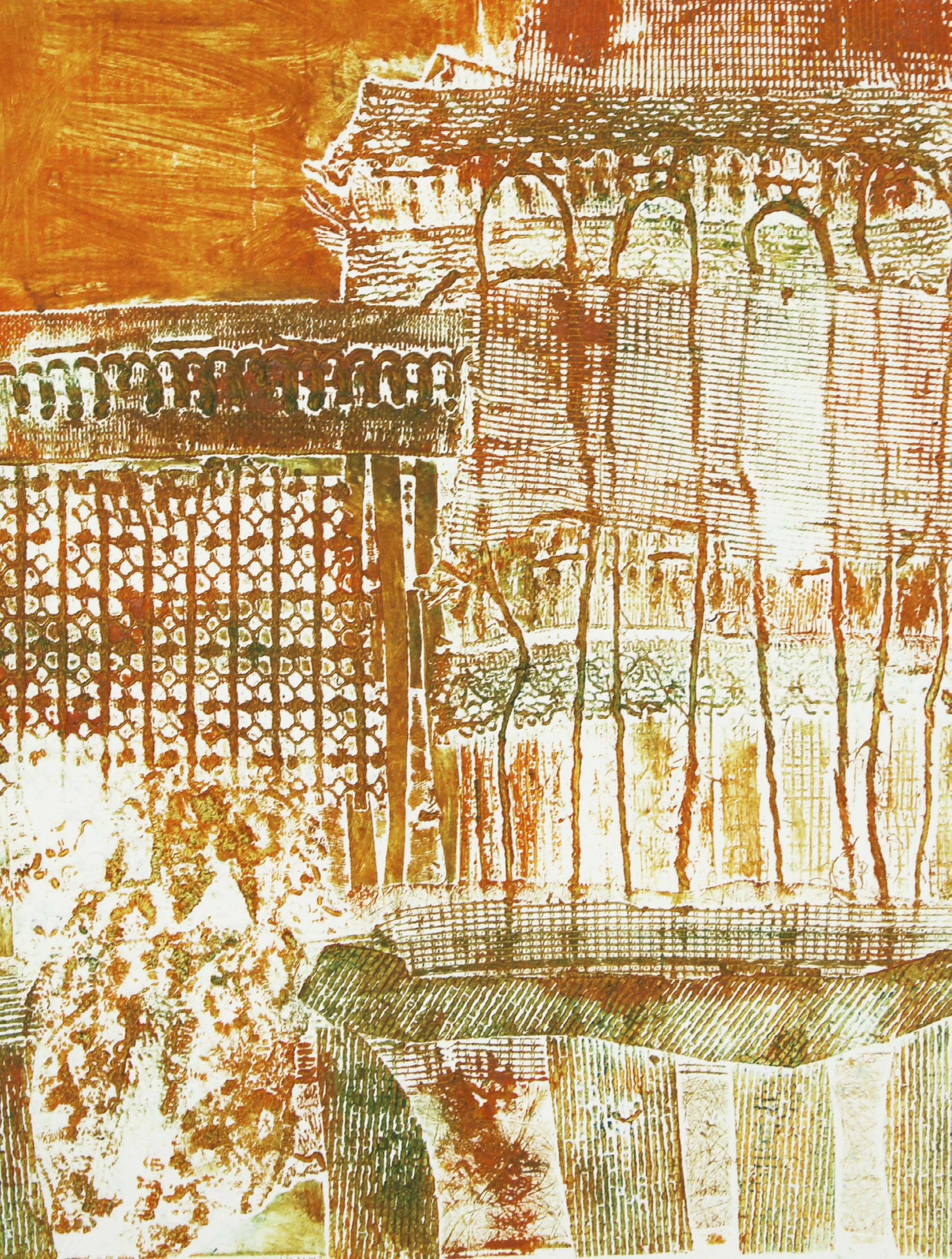

CODA
2022-2023
CODA Editorial Team
STAFF CONTRIBUTORS
Ms L Chamberlain
Ms P Evernden
Mr N Ramsden
STUDENT CONTRIBUTORS
Year 9
Iona
Year 10
Aisha
Alice Se
Alice St
Aliyah
Anna
Caterina
Hera
Poppy
Sofiia
Year 11
Emilia
Karis
Madeleine
Rosie
Year 12
Abby
Ella
Evie
Imogen
Millie
Olivia E
Olivia S
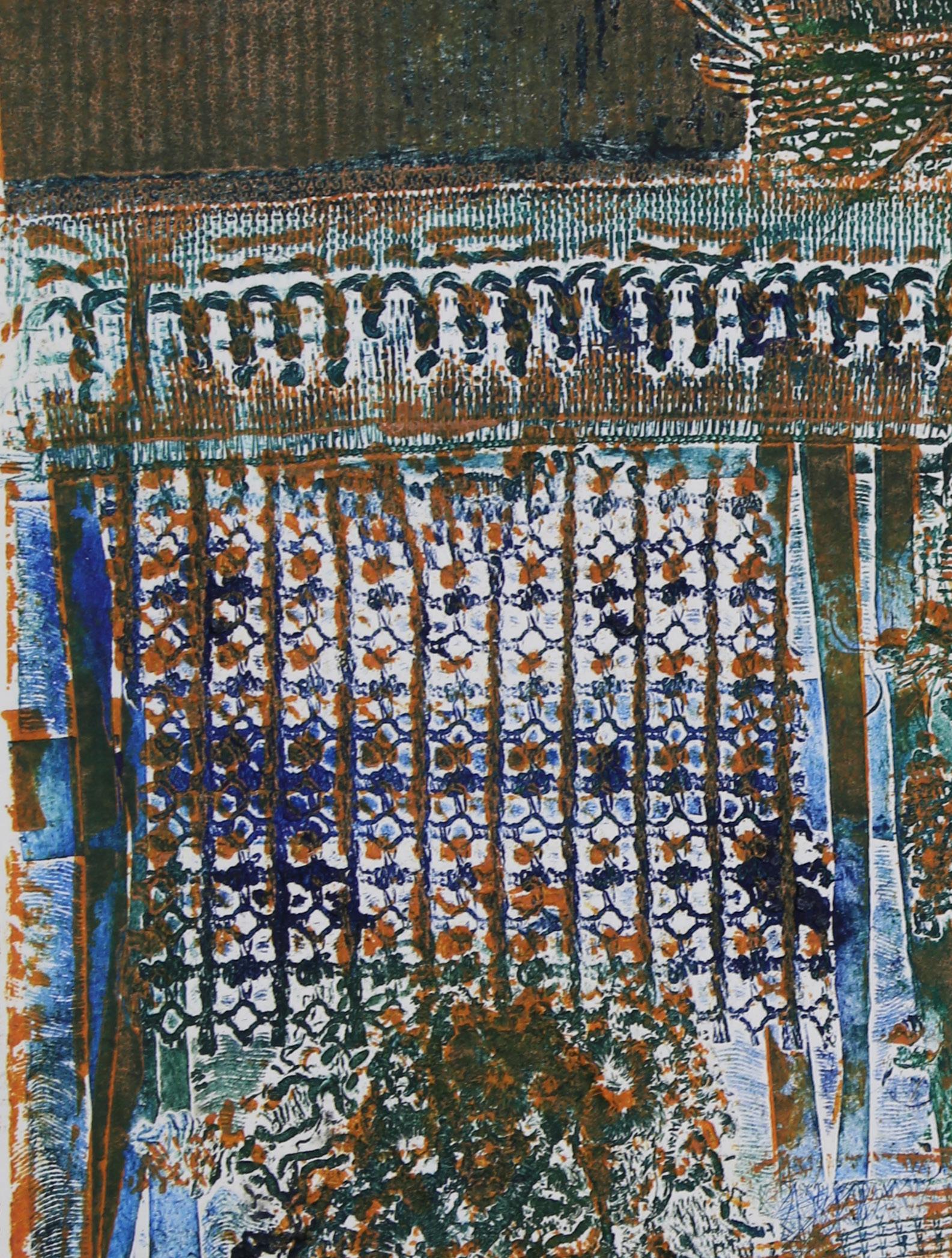
Year 13
Anika
Beth
Elsie
Daisy
Elizabeth
Emma
Isabella
Isobel
Jemima
Katie
Lily
Maddie
May
Rosie
Ruby
Sasha
Sophie
EDITOR
Mrs O Cornes
With thanks to:
Ms S Mehaffey
Ms S Pelling
ARTWORK ON COVER AND PAGES 2 & 3
Maddie, Year 13
DESIGN, ARTWORK AND PRODUCTION
Firebrandcreative.com
CODA is a word sometimes used to refer to the concluding passage of a piece of music, forming an addition to the basic structure. It has been the name of Walthamstow Hall’s Senior School magazine for over fifty years.
Our new Headmistress, Ms Louise Chamberlain started in her role after the Summer Half Term 2023. An interview with Ms Chamberlain can be found on pages 4-5.
This edition of CODA reflects the final year of our outgoing Headmistress, Miss Stephanie Ferro.
“The last academic year will live long in the nation’s memory for its historic importance: the death of Her Majesty Queen Elizabeth in September 2022 and the Coronation of King Charles in May 2023. In between these extraordinary bookends, Walthamstow Hall pupils continued to reflect on what it means to lead purposeful and compassionate lives in today’s world - and have fun along the way!
I am confident that you will relish the stimulating articles in this year’s CODA,

in which our students reflect on some of the complex global issues as well as their passions and interests.
It makes me very proud to see how positive an impact they are having and will have on society. The future is indeed bright in their hands!
My sincere thanks to Mrs Olivia Cornes and the student reporters who have encapsulated yet another momentous year.”

anieFerro
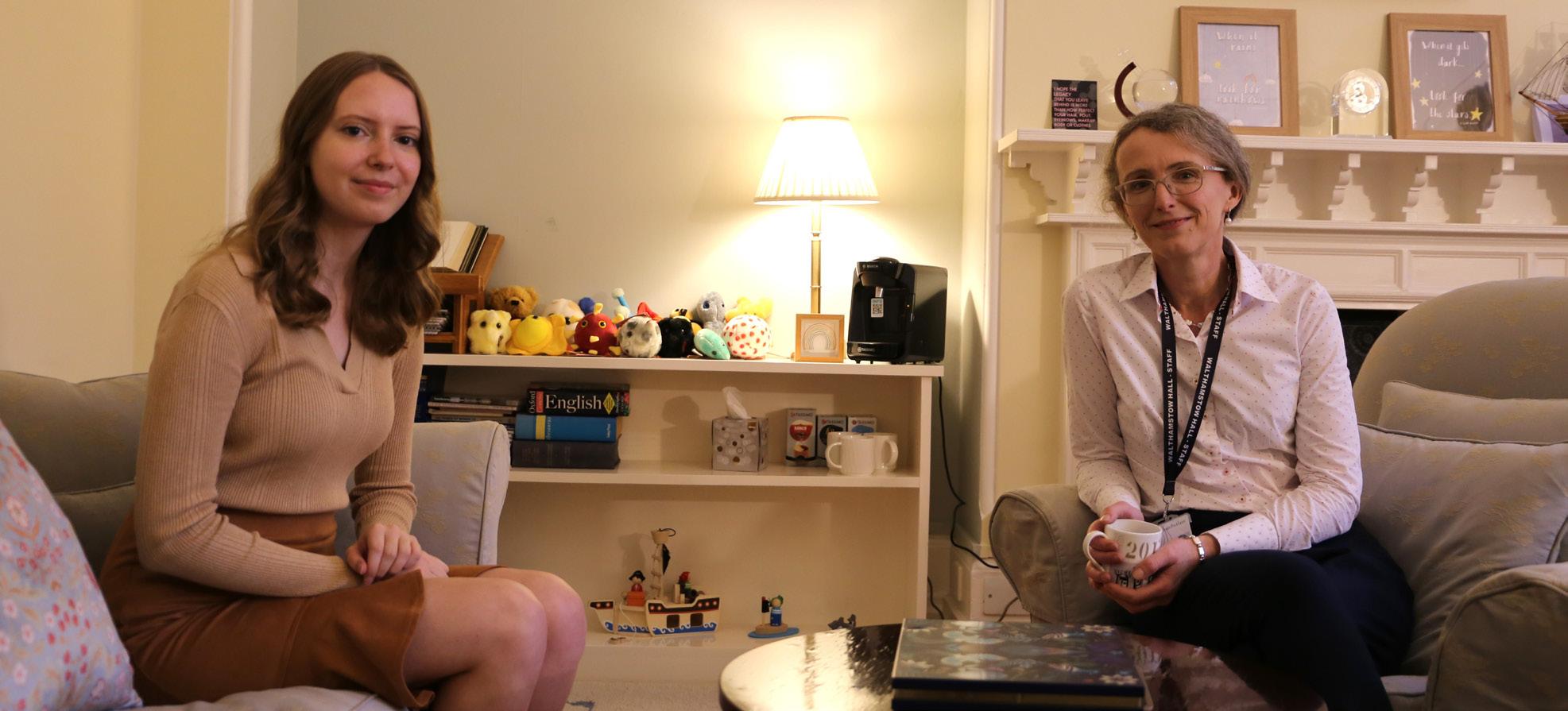
IN CONVERSATION WITH
Headmistress Ms Chamberlain
BY IMOGEN
The first time I visited the Headmistress’ office at Walthamstow Hall was prior to joining the school, for my entrance interview. On that occasion I walked down the corridor wondering what sort of questions I might be asked. Now, in my final year at school, I have been invited to interview our new Headmistress, Ms Chamberlain. I arrive with questions that have been posed by pupils, staff and myself.
WHAT WERE YOUR FIRST IMPRESSIONS OF WALLY?
My first impressions were that it was an absolutely lovely school. When I first came to visit, I just fell in love with the whole place. I had an incredibly positive impression of the staff, their level of professional enthusiasm for their work, and for the pupils. Both the pupils I met formally and the students I met while touring the school were very confident in such a positive way..
HOW DOES THE SCHOOL COMPARE TO OTHER PLACES YOU’VE TAUGHT IN?
I have taught in a big range of schools from big split-site comprehensives to very selective independent. While these schools were very different, there were also many similarities in that all students have the same hopes and concerns. One of the things I have noticed about Wally is that the behaviour of the students is amazing. Pupils’ engagement with their teachers is fantastic. So, it compares very favourably, I would say.
WHAT’S
YOUR VISION FOR THE SCHOOL?
This is already a super school where everybody can find a place where they can shine. One of the risks, if you change a lot of fundamental things quickly, is that you can lose what’s special. So, I’m not looking to change things that are working well but am looking at how we can make them even better.
WHAT DO YOU THINK ARE THE BIGGEST CHALLENGES FACING GIRLS LEAVING SCHOOL?
I recently went to hear Mary Beard talk and somebody asked her a similar question. She said in her generation they thought that improving things for young women would include practical things such as being able to access all careers.
It should be possible for a woman to make confident choices that work best for her. To be able to go about your daily life and feel safe. As a society in Britain we have made some real progress, but it’s not consistent. There are still challenges.
IS THE ALL-FEMALE ENVIRONMENT SOMETHING YOU WANT TO KEEP IN THE UPPER SCHOOL NOW THAT BOYS ARE BEING INTRODUCED LOWER YEARS?
We have introduced little boys in the nursery. They are at a very different developmental stage from Sixth Formers. Research has been done that showed the advantage that an all-female Sixth Form gives in terms of better outcomes at university and in the early stages of your career. The researchers thought it was because girls got all the opportunities in those environments.
When I think back to my school days at an all-female school, all of the senior pupil role models were female. Wally provides the same environment and that builds confidence in the pupils.
ARE YOU PLANNING ON CHANGING ANYTHING IN SIXTH FORM SPECIFICALLY?
I’ve been talking to [Head of Sixth Form] Mrs Brown about the Sixth Form to get a better understanding of what’s working now and then for us to consider if we could make some small improvements. We want to focus on supporting you to have great holistic outcomes. Before the pandemic I hadn’t fully realized how important the social side was for Sixth Formers, it was remarkable how much the lack of it affected people. The first thing is that you should be well taught and we know that our great teachers make a really positive impact on your A Level grades, but I also want to see the students having fun and enjoying Sixth Form.
We’re fortunate that we’re so close to the centre of town and, as we don’t have Saturday school you can have a job at the weekend. If anybody in the Sixth Form has any ideas on improvements, you are welcome to have a chat when my study door is open.
WHERE ARE WE ON THE DECISION TO DISCONTINUE THE SUMMER DRESSES AND WHY WAS THAT TAKEN?
When I first arrived, feedback on uniform from across the school community led me to set up the Uniform Working Group of staff members who are looking at the uniform across school.
Students, parents and staff will have different feelings about different parts of the uniform such as: can you put it in the washing machine? How much does it cost? Is it comfortable? Does it represent the school well?
Thinking about the summer dress, one question was, why do some people wear a jumper over their dress on a very hot day? Is it because it has actually been outgrown and is expensive to replace? I’m very open to what recommendations the Uniform Working
Group bring to me but first, importantly, they are going to be talking to lots of different people before they present their findings.
WHY DID YOU GET INTO TEACHING?
I read Microbiology at University and afterwards I weighed up my interest in the brain and neuro-immunology along with my experience of voluntary work at primary schools. I love Biology but I went into teaching with a strong focus on accompanying the healthy formation of young people.
DID YOU HAVE A FAVOURITE TEACHER WHO INSPIRED YOU?
I had lots of really good teachers when I was growing up. One of my Headmistresses, Sister Gerard, was a nun with a real sense of warmth; she inspired everybody to behave themselves and do their best. My secondary school was an all-girls’ school with amazing teachers like my GCSE History teacher, Mr Murphy and A level Biology teacher, Mrs Mulkerrin, who had an enthusiasm for bringing subjects to life.
DID YOUR EXPERIENCE AT SCHOOL INFLUENCE YOUR CHOICE OF A SCHOOL WITH A CHRISTIAN BACKGROUND NOW?
Most of the schools I went to were faith schools. They were definitely looking for what was good in you; it was about the whole person and that has definitely influenced how I view education. I see it as not just a transactional process, where you come out with certificates, but also about the kind of person that you become; whether you become someone who is there for other people and want to contribute to society.
DID YOUR OWN CHILDREN STUDY SCIENCES LIKE YOU DID?
My son studied Biology with Computer Science at university and followed by a Masters in Advanced Computer Science. Then my daughter read Molecular Cell Biology and is hoping to start a Masters in Bioinformatics next year. As a parent, you inevitably bring your child along to the things you find exciting, but there was definitely no pressure from me for them to go into the sciences.
DO YOU HAVE A FAVOURITE BOOK?
I’ve got lots of favourite books! I’m interested in how the brain develops and particularly how the brain can be affected by challenges in early life, so I’ve brought a few books about that with me. Other favourites in my study here are High Challenge, Low Threat by Mary Myatt, Double Lives by Helen McCarthy, which is a history of working motherhood in England, and Professor Sue Black’s book Written in Bone about the legacy on your skeleton of your life experiences.
Fine Art


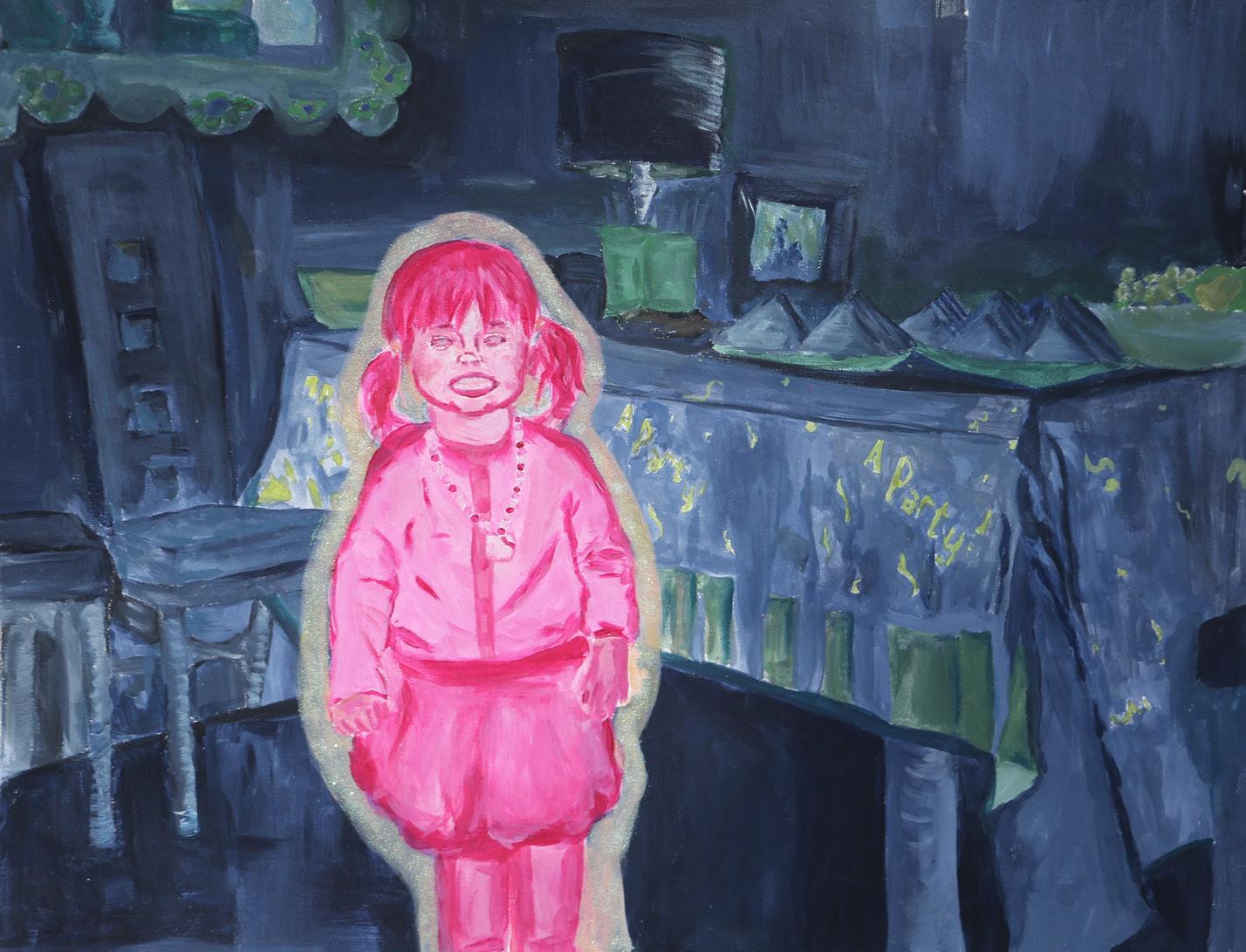
GCSE Fine Art by: top left Georgia, top right Ella, bottom Freya



GCSE Fine Art by: top Isabel, bottom left Rosemary, bottom right Scarlett


Fine Art
A LEVEL

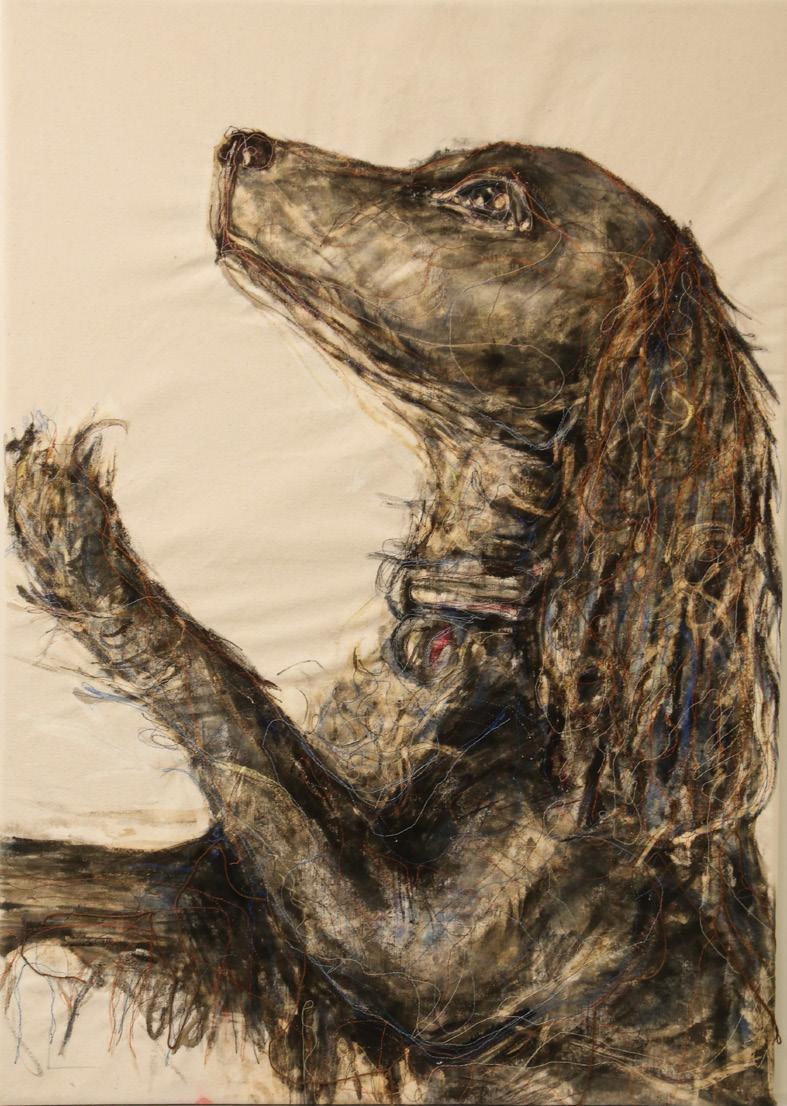


13 A Level Fine
Year
Art by: top Madeleine, bottom left Elizabeth, bottom right Maddie
Car Club - Wally Greenpower -
× × × × ×

Months of fundraising and car-building came to fruition when the Wally Greenpower Club took its electric car to race at Goodwood and then Ford Dunton in April and July 2023.
The project was part of the Greenpower Challenge, a national competition for schools to design, build and race electric cars. The challenge is to use the same motor and batteries as the other teams and see who can go furthest in 90 minutes, so it is a balance of economy and speed.

Assembling the car
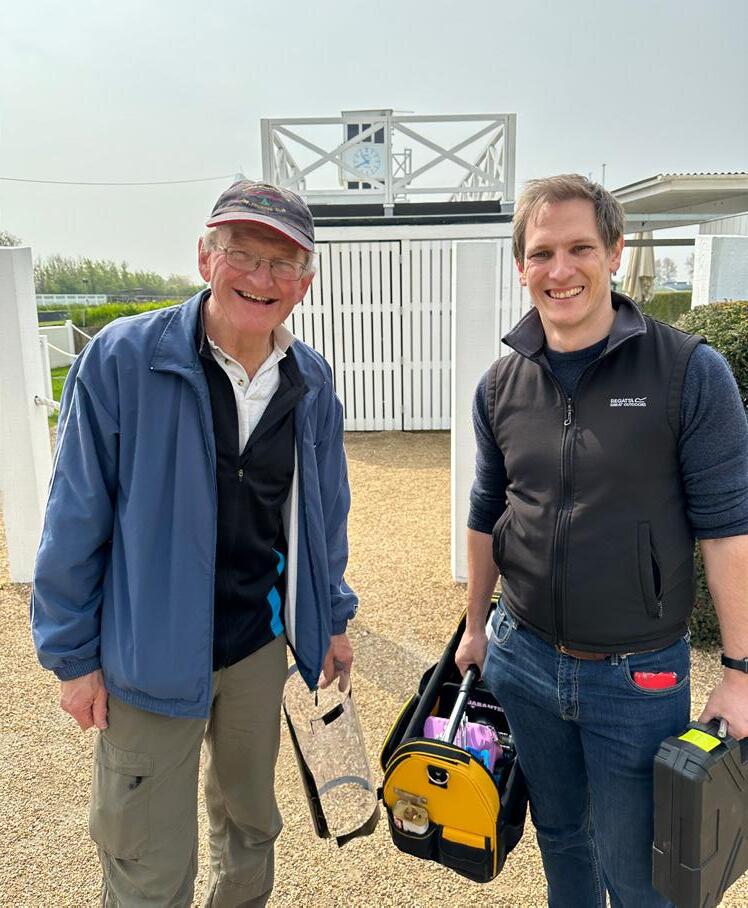
Head of Physics, Mr Hill (on right) – aided by Design Technician Mr Hayward - led the team in building, refining and testing the car during lunchtimes and after School.
Team leaders
Caterina, Year 10:
“It’s so cool to drive the car after spending the last six months building it. I’d never done any engineering before so I enjoyed finding about all the mechanisms, learning how to use the different tools and being part of the team.”

The drivers learnt fast and performed well, finishing in the top third of entrants at Ford Dunton.
Iona,
Year 9:
“I had rain all over my visor and I couldn’t see! I had to keep taking one hand off the steering wheel and wiping it. I’ve learnt to keep an eye on my wing mirrors and keep on the inside lane, then people can’t overtake me so easily. It was really fun!”
Poppy,
Year 10:
“Handovers can be stressful. It takes a good few minutes to stop, unbuckle your seatbelt, get out and for the other person to get in and adjust the straps.
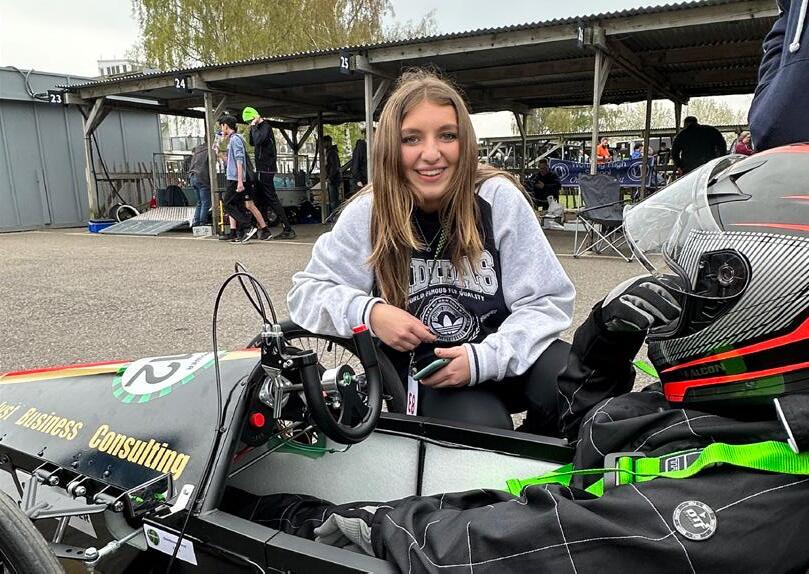
Evie, Year 12:
“I decided before I joined Wally Greenpower Club that I wanted to do Mechanical Engineering at university and that idea has definitely been reinforced. I like the hands on aspect, being involved and not sitting at a desk. Here at Goodwood, I’m in the pit lane, doing all the changes with the drivers. When the race begins, we’re in charge!”

Alice, Year 10:
“There aren’t any pedals so it is all based on the controls in the hands. The car only goes at one speed so you have to get sharp turns and be tactical as to where you drive and overtake.”

Many thanks to our generous sponsors for making Wally Greenpower possible: WHF&P, Atelier Design Consultants, Catalyst Business Consulting, Dandycorp Productions, Emily Cates, The Davie Family, Rebecca Davie, Pandora Fox, the Ford Family, Team Froud, The May Family, Rosemary M, Lisa Robinson, Sam Yuide.
Caterina
Evie The Team

THE CAR Debate.
“ WALLY ECO MAG
This article first appeared in the Wally Eco Mag, a new online publication written by students.
Climate change. A hot topic, quite literally, that has been at the forefront of everyone’s minds for quite some time. We have seen strategies to combat climate change like investing in renewable energy and some small-scale wins like using LED lights, but a strategy that has been put forward as the new best way to reduce carbon emissions may not be as beneficial as you think.
Tesla owners, this is going to be a struggle to read. But yes, electric cars. These futuristic cars, supposedly the motors of the future which promise a green and sustainable way to travel without contributing to fossil fuels, are slowly taking over our roads. But what makes them so bad for the environment?
Lithium-ion batteries can be found in most if not all electric vehicles which enable them to be recharged over and over again.
Extracting lithium from the ground requires vast amounts of water and huge deposits of the metal are found in one of the driest places on earth: Salar de Atacama, in Chile. Author of a 2022 report for the Natural Resources Defense Council, James Blair, says the mining “contributes to the ecological damage of internationally recognised wetlands where water resources are already exhausted for local and Indigenous Peoples.” Many of these communities receive little benefit from the mining operations.

Lithium mining operation in the Atacama Desert, Chile
Awareness is important, and increasing our knowledge of our current technological limitations can help us work together to form better solutions in the future.
Now we know the impact of mining, just how much raw material is needed for a car battery? This question is met with even more saddening news. A typical EV battery has about 8kg of lithium, according to the International Energy Agency. Global demand for the metal is rising rapidly.
Cobalt is another metal needed for EV batteries and most of the world’s deposits are found in the Democratic Republic of the Congo. Amnesty International’s 2016 report into the human cost of extracting cobalt found the biggest suppliers in DRC “employ” children as young as seven years old to wash and sort the ores. They are described as “artisanal miners”.
And here comes our next challenge. Repeating the process of recharging over time minimises the amount of charge the battery has, which in turn decreases the range and time needed between each journey, until eventually it needs to be replaced. Manufacturers currently have a five-to-eight-year warranty on their battery, which is not a lot of time before the battery has to be replaced. On top of this, the battery is also hugely flammable.
In July 2021 in Victoria, Australia, a 13-tonne Tesla ‘Megapack’ facility caught fire which took three whole days to stop burning. During that time the burning contributed to surplus ecological hazards including toxic smoke which surrounded residents. Engineer Robin Mitchell told Spiked-online.com ‘The most significant danger of a lithium-ion battery is that [fires] are almost impossible to put out once they are ignited’.
Given all the issues outlined above, we can see that electric vehicles aren’t the easy environmental win they have sometimes been made out to be.
I am not here to discourage electric vehicles as I believe there should be a push to continue researching into electric cars and improve battery solutions, nor am I encouraging you to continue to use diesel or petrol vehicles. However, awareness is important, and increasing our knowledge of our current technological limitations can help us work together to form better solutions in the future.
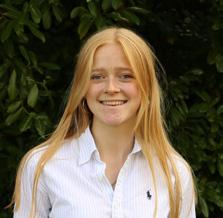
BY ELLA
PHOTOGRAPHY


THREE DIMENSIONAL DESIGN
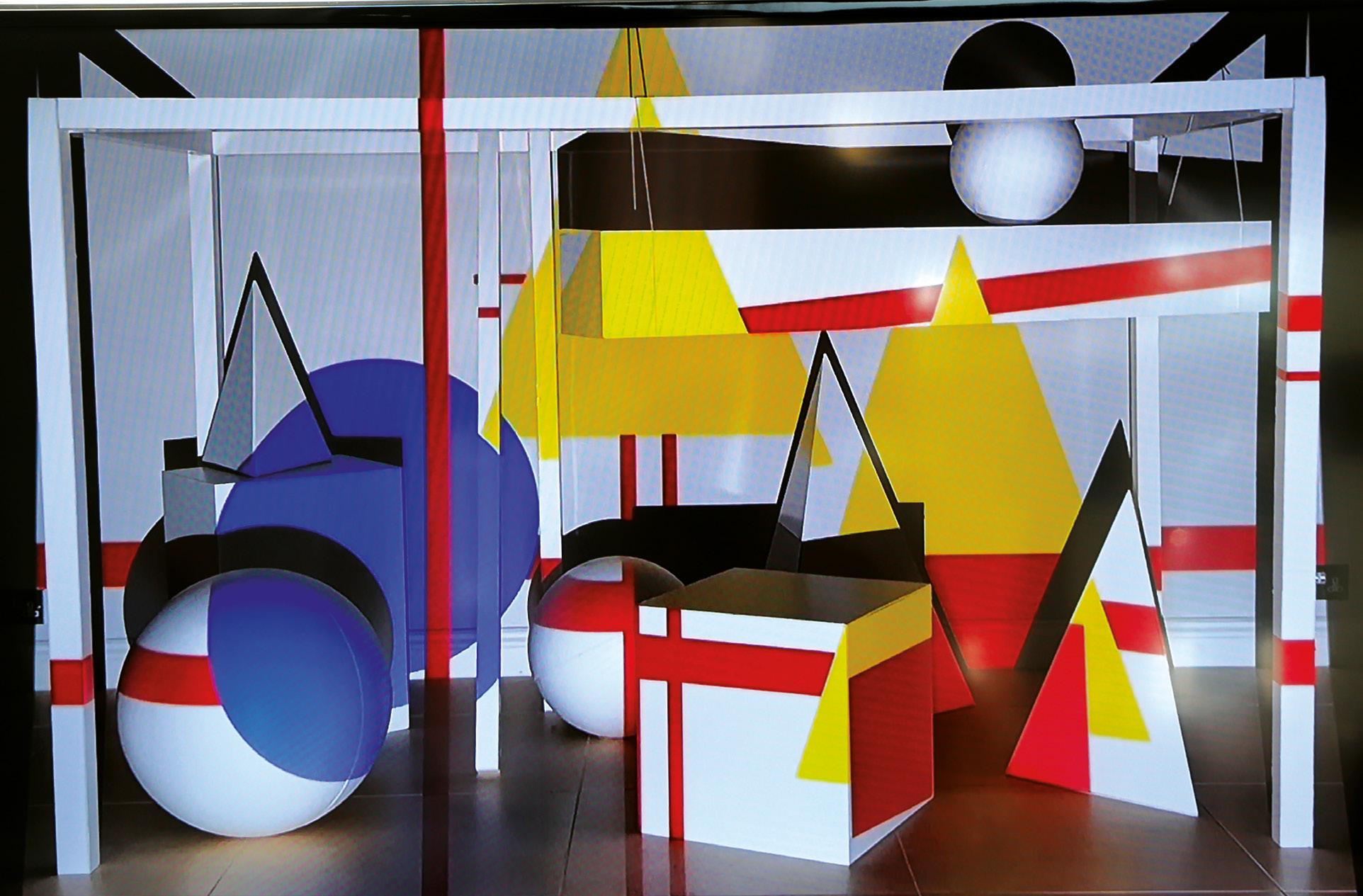


A Level Textiles



A Level Textiles top left Elsie, top right Ava, bottom Holly




A Level Textiles top Elizabeth, bottom left Ruby, bottom right Iona
THINKING
ABOUT
Thinking
Our new Director of Studies, Polly Evernden plays a key role in our educational provision; she ensures we are offering the best curriculum for our students and she works to ensure our teaching practices are of the highest standard, engaging students at the top of the ability range and those needing more support. Ms Evernden also gives fantastic presentations on staff Inset Days! CODA is delighted to hear her thoughts on educational practice.
Teaching is a complex job. Some have argued that it’s more complicated than brain surgery and not dissimilar. Both and a teacher and a surgeon have to alter the brains of the people in front of them. However, the brain surgeon works on just one brain at once, whilst the teacher works on twenty brains at the same time, all of which are slightly different. The brain surgeon has a physical view of the changes that they are making, whilst the teacher cannot see all the effects that they are having on the brains in front of them.
The fundamental difference, I suppose, is that, as a teacher, your students are unlikely to die if you move your board marker a millimetre in the wrong direction. However, evidence shows us that small modifications in our practice as teachers can make a significant difference to learning and, at Wally, our focus on using the very best teaching methods ensures that our students get the very best learning outcomes.
We know that our learning outcomes are among the very best there are, because our Value Added Scores are consistently outstanding. Value Added is a measure of how much progress a student makes from their entry point in Year 7 up until their GCSE exams and then from the start of Year 12 to their A Levels. It is a national system run by Cambridge University which allows us to see how much progress our pupils make compared to those at other schools – and the results are very clear.
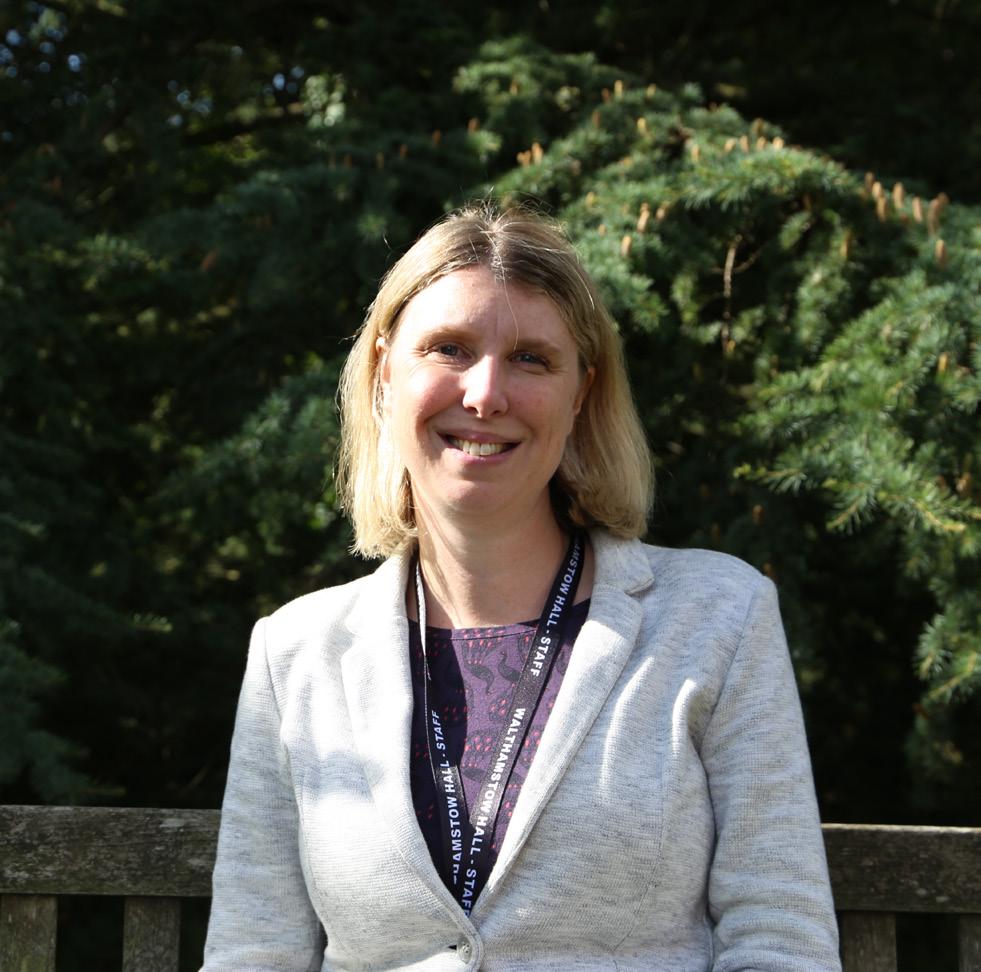
Polly Evernden DIRECTOR OF STUDIES
Value Added Success
Last year our Value Added score was in top 10% for GCSEs and the top 6% for A Levels nationally. This means that, overall, last year’s Year 13s got a better set of grades here than they would have done if they had all been studying at 94% of other schools in the country. In a national picture of dropping results, ours went up, with the percentage of top grades higher than their pre-pandemic levels.
This doesn’t happen by chance. It is the result of skilled, passionate teachers who use their expertise to ensure that everyone in their classrooms learns effectively. As a school, we have been exploring some of the best educational research out there, so that we can apply it to our lessons.
We have been focusing particularly on the work of an American educational researcher, Barak Rosenshine, and his seminal work, Principles of Instruction. Rosenshine spent many years investigating the components of great teaching. In order to determine this, he combined his knowledge of cognitive science with a series of research studies on particular teaching techniques and observations of teachers whose classes consistently got the best results. His distillation of what constitutes effective teaching is pleasingly familiar to most teachers, but just like just the brain surgeon, the skill and precision with which each of these principles is enacted is fundamental to how deep and long-lasting the learning taking place will be.
Rosenshine’s ten principles for great teaching:
To understand is to remember
One of Rosenshine’s principles that seems blindingly obvious at first glance is that teachers should ask questions. However, the number, style and targeting of those questions is what counts. The cognitive scientist, Daniel Willingham tells us that ‘memory is the residue of thought’. We remember what we think about and we remember more securely what we think deeply about. This means our teachers work to maximise the thinking of every student through every question they ask. There are many different classroom techniques that facilitate this, but at their root is increasing the thinking ratio of their students; the more they think, the more they remember.
Independent practice
Daily review 10. Weekly and monthly review
Rosenshine’s exhortation to teachers to present new material in small steps is made imperative by the fact that we know our working memory, the short-term processing part of our brain, is quickly overloaded. We can’t hold more than about seven pieces of new information in the right order in it before things start dropping out.
Don’t feel bad, therefore, if after your first day in a new job, you can barely remember anything you were told, including, rather awkwardly, the names of your new team. That’s not a specific problem you have, that’s the limits of working memory. As teachers, we strive to be sensitive to this and make sure that we break things down into small steps – and we hope our students will be kind to us as we try to learn over a hundred names in September.
Anyone who at university got adequate rather than exceptional marks on their essays, but who had no idea what those essays from their peers getting firsts looked like, will recognise Rosenshine’s emphasis on the fundamental importance of modelling. To be excellent you need to know what excellence looks like.
Focusing on memory in education sometimes causes a raised eyebrow from sceptics, for whom it conjures visions of dull, rote memorisation of unrelated facts. However, this is to do an enormous disservice to the very vehicle of learning itself. In fact, one of the definitions of learning is ‘a change in long-term memory’. Indeed, to say we have learnt something and to say that we understand something is to say that we can remember it. As Daniel Willingham writes, ‘understanding is disguised remembering.’
In recent years educationalists have tapped into what science tells us about how memory works much more robustly, and crucial to it is what Rosenshine refers to as daily/weekly/monthly review. By forcing the brain to retrieve previously learnt information from long-term memory into working memory, it secures that knowledge more firmly, as well as making it more readily accessible the next time you need it. This is why you can remember the password to your work email, but are bamboozled by the one for your electricity bill account which you barely ever use.
We call tasks which force students to bring up knowledge from their long-term memory into their working memory Retrieval Practice, and it’s incredibly powerful. We have been working hard to inform our students about what a difference this active process of recall makes to their long-term learning, as well as its crucial role as a revision tool for exams.
One fundamental aspect of great teaching and learning, which is harder to distil into a set of principles, but is in evidence in our classrooms at Wally, is not only the skill of our teachers, but their commitment to their role. Just like surgeons, we know that we hold the brains of others in our hands and we never forgot that, though it is a complex responsibility, it is also a privilege..
Diana Committee THE

This year we held many conversations about diversity, inclusion and increasing our understanding of the different cultures within our School. Our new Diana Committee worked hard to promote awareness of these issues and earned a Respect Badge from the Diana Award charity for its efforts. This charity was set up in memory of the late Diana, Princess of Wales and is aimed at empowering young people to make positive change.
SPOTLIGHT ON CULTURE PRAYERS
One key action towards earning the Respect Badge was a Prayers celebrating people’s different cultural backgrounds. Students from Years 7 – 13 told the School about aspects of their life referencing a huge number of nations:
India
The idea for Spotlight on Culture came from a proposal put forward by a group of Year 10s at School Council.
Aliyah: It was October and we didn’t have anything on for Black History Month. We realised it would be a good idea to educate the whole School community on different cultures.
Hera: We wanted to celebrate culture overall and we wanted everyone to enjoy it with us.
Alice: We included different year groups to get as many perspectives as we could. There is always more that can be said about all of this, but it was a good start.
Hera: We had some great feedback from students and staff and it was a good way of connecting with students across the School who might have similar cultural backgrounds.

Year 10s: Alice, Hera and Aliyah
The Diana Committee before its inaugural meeting


first badge
DIVERSITY AND INCLUSION QUESTIONNAIRE
Daisy: I am a Diversity and Inclusion Prefect, so with my friend Maja we created a questionnaire on this topic for students. We had input from Miss Ferro, [Pastoral Head] Mrs Franzen and [RE teacher] Mr Pollen. Once we had agreed on the questions we sent it out to the Senior School and 250 students responded, which was really good! This gave us lots of information about where to direct the Diana Committee. The Diana Committee wasn’t my intention when I thought of the questionnaire, but I guess it was a good outcome.
Izzy: Some people said they didn’t feel they could truly express themselves and ‘be’ a part of their culture within School. Respecting other people’s cultures and beliefs - this was something we already knew could be improved upon. There were also calls for an LGBTQ+ support group. As a result of the questionnaire we decided to aim for the Respect Badge.
Daisy: Our aims were to make sure people knew who we were, to let them know they could come and talk to us, to show the ways in which we are trying to improve the School community,
and how different levels of diversity are heard by various groups in the School. Representatives from each year group joined the Committee and we meet every half term.
Izzy: To be in the Diana Committee you have to do some sort of training, there has been anti-racism training and anti-bullying training. Other actions taken include:
• An Assembly on how to be an ally for the LGBTQ+ community, explaining what an ally is and why it’s important
• In Anti-Bullying Week we talked about how to be an upstander, not a bystander, trying to instil the anti-bullying message across the School
• We spoke to Year 7 parents for ten minutes during a pastoral evening, telling them what the School was doing to help with inclusion
• [Head of Learning Strategies] Mr Williams gave a talk on neurodiversity to Years 11 and 13, explaining the sorts of challenges people with learning difficulties face
DIANA COMMITTEE ACTION IN AUTUMN 2023:
1. Three Sixth Form members took their learning to Otford Primary School, giving an anti-bullying workshop to Years 5 & 6
2. Year 7 & 8 members undertook a day of training in Brighton then delivered key messages in PSHEE lessons and form time
3. Fundraising for a mental health charity
4. Gave an assembly in National Anti-Bullying Week
Our
from the Diana Award
The Diana Committee’s inaugural leaders were Daisy (Chair) and Izzy (Secretary)
SCIENCE WEEK
Save Earth!
Students were set House challenges on energy, biodiversity and healthy living across the week, culminating in a celebration of our beautiful planet with farm animals on the front lawn.


Top: Creating a solar carousel to generate energy
Bottom: Building bug hotels to encourage biodiversity

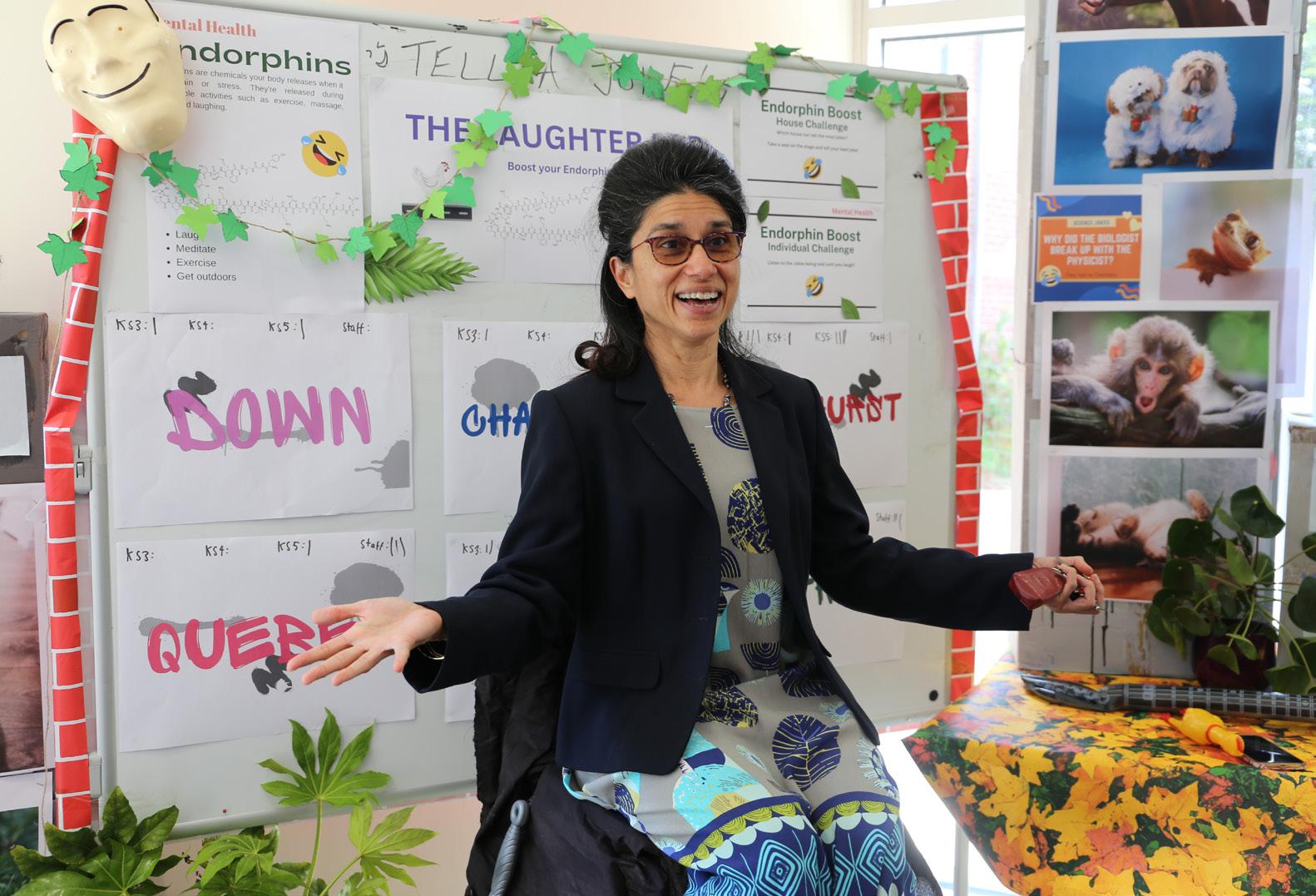

Top: Miss Ferro enjoying a joke and releasing endorphins in the Laughter Lab
Bottom: Brasted Farm cows (and their ice cream) on the front lawn at the end of Science Week
Inset: Duck eggs hatched in the Science Block during the week
3 DIMENSIONAL DESIGN
Year 7 and 8
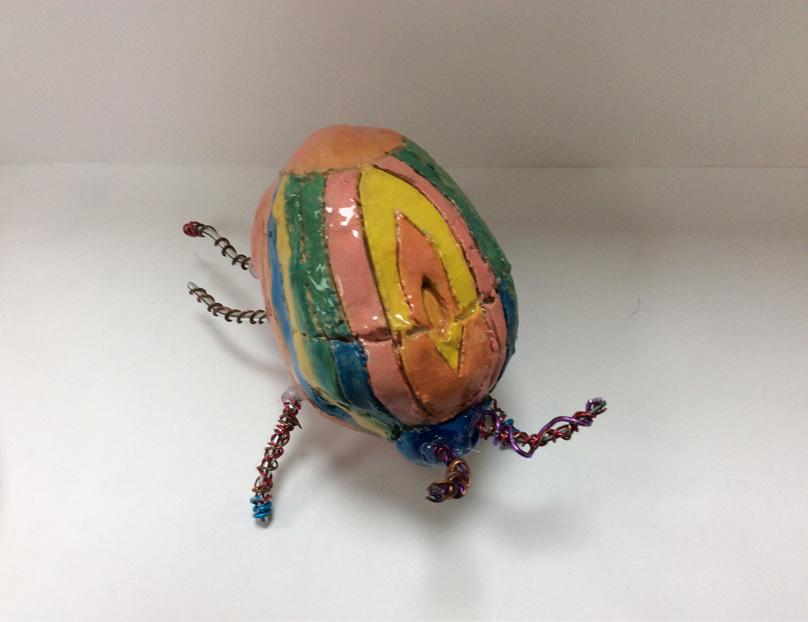


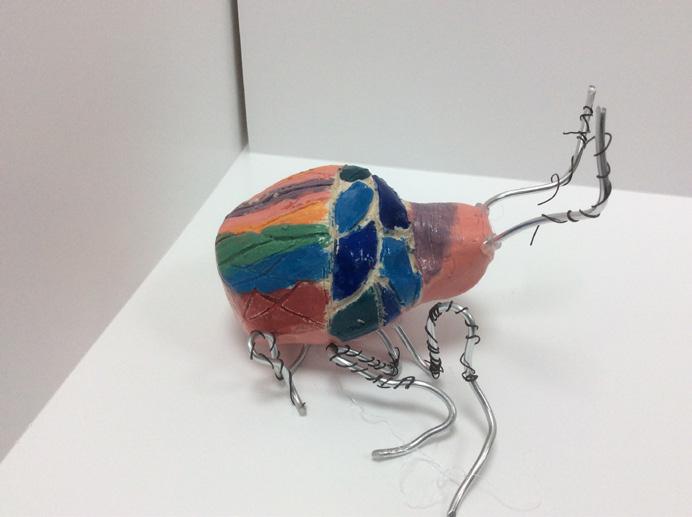


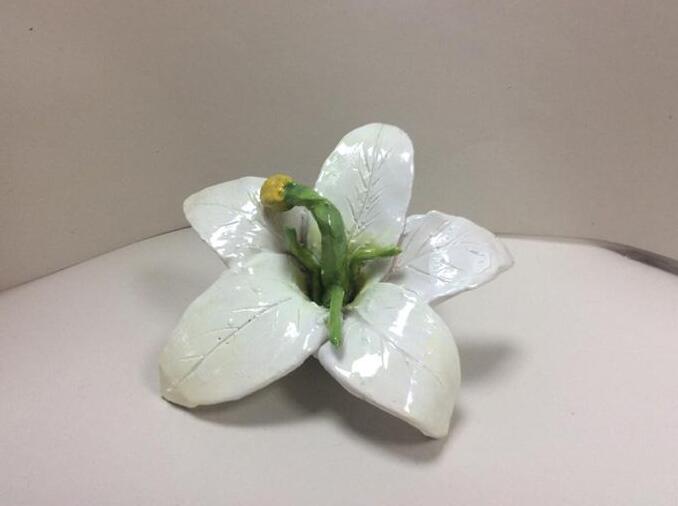

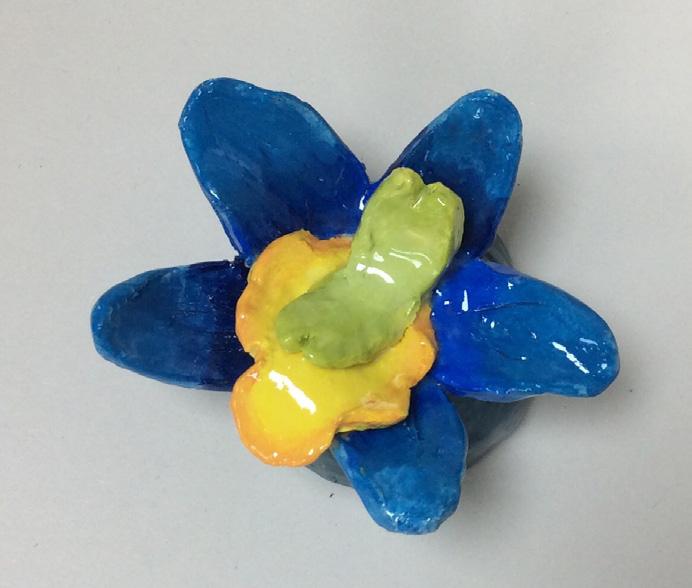
Year 7 fashioned clay, wire and other bits of scrap into junk bugs
Emily P
Suzanne
Annabelle
Rachel
Margot
Valya
Lena
Elsa
AbigailS
FINE ART Year 9
Portrait and PatternMe, Myself and I culture project






Neve
Annabel
Hatty Emma
Araba
Flora
Ukrainian Viewpoints

Walthamstow Hall welcomed nine students from Ukraine in the Summer Term of 2022, just a few months after their lives were turned upside down by Russia’s invasion of their country. Three of them: Anna, Sofiia and Aisha spoke to Year 12 students Millie and Imogen about how they found life at Wally and in Sevenoaks a year after arriving.
How does Ukraine’s education system differ from the one here in the UK?
Sofiia: It’s really different - we don’t do GCSEs and A Levels, we do a different exam. We do all the subjects, there is no choice about what we would like to do. We don’t do Art and Drama, so it’s mostly a bit boring. We are more into Maths and Science, unfortunately.
What are your favourite subjects?
Anna: 3DD, Drama and Art, the creative subjects, which we don’t have in the Ukraine so it’s new to us. Our Art in Ukraine is rubbish!
We have heard that the Maths in the Ukraine is further ahead than in the UK – Is that true?
Sofiia: Yes, and we don’t use calculators at all.
Could you judge that in terms of years?
Anna: Yes, Sofia and I are meant to be in Year 11, but we are in Year 10 and doing stuff in Maths that we did in Year 7, it’s so easy.
Sofiia: We cover things in Maths in more depth whereas here you just quickly cover something and move on.
Is this across subjects or just Maths?
Sofiia: Just Maths. We don’t get examined in all the subjects but have an end of year exam in Year 9 and Year 11, which is the last year of school
Anna: We go to university at 17 and we start school a year later at 6 years old.
What have you enjoyed about 3DD and Drama?
Sofiia: Last year I made a teapot that I’m pleased with. In Drama we did a performance we made ourselves that was fun. We did a devised play for GCSE, and we performed it to St John’s Primary School.
How long did it take for you to settle into Wally? What were some of the challenges you faced?
Sofiia: Probably English, as it’s not our first language, so it was a bit hard.
Anna: Also, as everyone already has their friendship groups it was hard to settle down in the first place. However, everyone was very welcoming and we have some friends now, it was also easier for us as we had each other to speak with in our native language.
We held a 12th Night ceremony to mark the Ukrainian Christmas. Are there any other major cultural differences that you have noticed?
Aisha: We put up a Christmas tree at New Year but it’s mostly the same. We celebrate New Year more than Christmas and get gifts on New Year rather than Christmas.
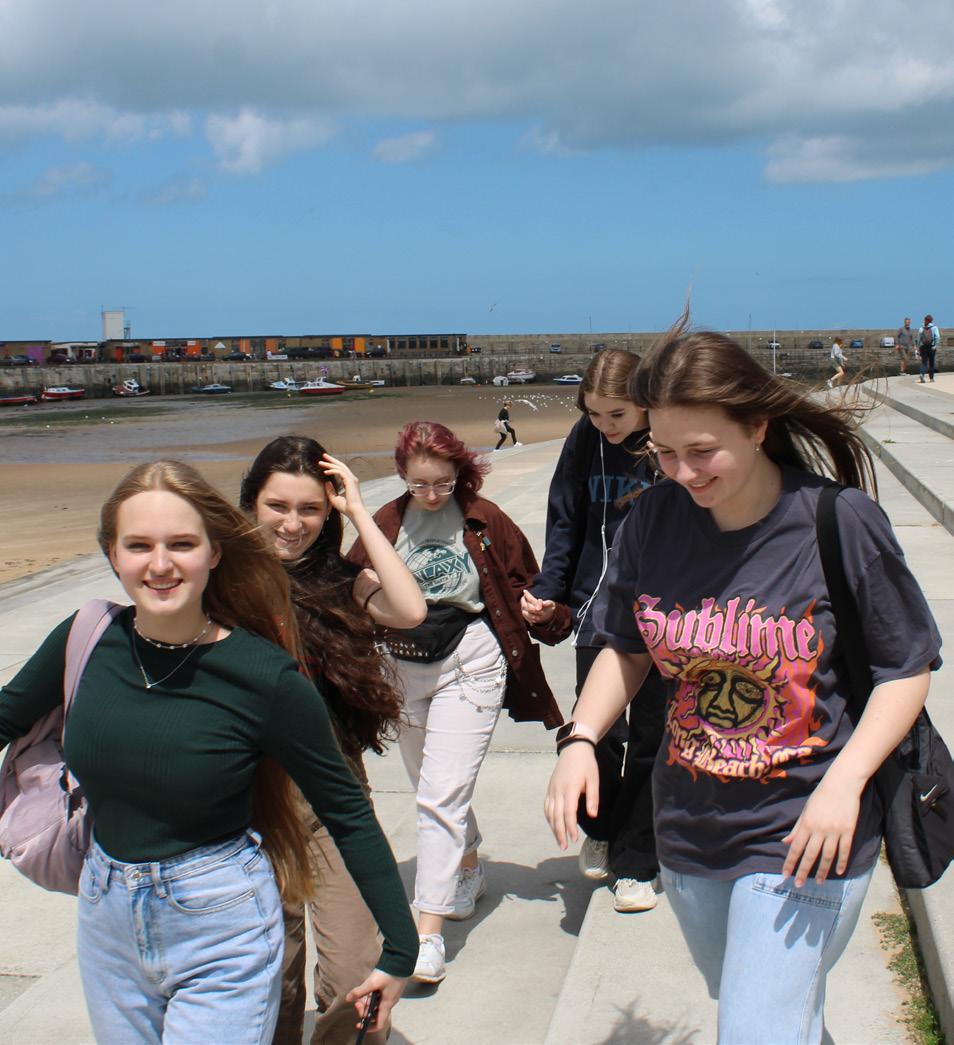
Sofiia: Our Easter is also different, we have egg fights with boiled eggs! You throw eggs at each other and if your shell doesn’t break then you win. It’s great fun and the whole family do it. We don’t have chocolate eggs, just real hard-boiled ones.
Anna: Also, we celebrate Independence Day, with parades. We guess you don’t celebrate as you’ve always been an independent country,
What was your first impression of Wally, Sevenoaks and England when you first arrived?
Sofiia: We loved it, especially doing new subjects such as Art. The houses are completely different, in Ukraine we lived in the capital and the city is very different from the countryside. It very nice here especially Knole Park and the deer.
Aisha: I really liked Sevenoaks, I found the older architecture very beautiful and the style of buildings and how it has all been maintained.

BY MILLIE AND IMOGEN
Five of our Ukrainian students went to Margate for the day during Exam Week
Duke of EdinburghAWARD SCHEME

Duke of Edinburgh plays a big part in life at Walthamstow Hall from Year 9 and up. We are an accredited centre which means we can authorise Bronze and Silver Awards. We can also run all our expeditions including Gold, in-house, as our DofE manager Mr Ramsden has his own activity provider (AAP) licence. The expedition is just one element of the Award, alongside the volunteering, physical and skills aspects.

Mr Ramsden
MA PGCE DOFE MANAGER WALTHAMSTOW HALL SCHOOL
“This is my 16th year as a DofE manager and I have seen how the Award gives confidence to young people, supporting them spiritually from Year 9 starting on their Bronze, through to Silver, to Gold, to university and life. Some of the young people I worked with are now DofE Managers and outdoor leaders themselves.
Doing the Awards can empower students with a sense of ownership and achievement. The expedition experiences are all about fun, friendship and being resourceful. Taking them out of their comfort zone and letting them make mistakes within a safe space is a wonderful process.
Volunteering helps them learn to be a bit selfless, from helping in care homes or animal sanctuaries, to being peer mentors and sports leaders. The Sports element, keeping fit, helps with mental health. The Skills section keeps the neurons firing and creativity flowing. They can harness our opportunities at School in drama, music, cooking, textiles and computer science.
I’m supported by a great team: Mrs Fassnidge is now a qualified Lowland Leader, which is one below Mountain Leader (I’m a Mountain Leader 4 star qualified paddle coach). We have a wonderful team of staff assessors, Miss Harris, Miss Ryan, Mrs Stafford and former student Miss Shaw are really dedicated DofE supervisors.
We are very proud of all our Bronze, Silver and Gold Award achievers this year and we are delighted that six students achieved their Gold in 2023.
Another highlight is the fact our participants completed over 1,755 hours of volunteering, which apparently equates to a social value of £8,440!”
Gold Award paddle board expedition, Norfolk Broads 2023

VOLUNTEERING
Olivia helped the child of family friends
“For my DofE Silver volunteering I helped a child with special needs with his speech and physical therapy.
This included me playing games with him, standing up to build his physical strength in his legs and other games like matching the words to their pictures.
The little boy’s name who I was working with is Lachlan and he is 7, three of his favourite things are puppies, chocolate cookies and [the Disney film] was born, our families are really close.

It can get very tiring for him to be doing hard work for a long time, especially if you are doing the same thing every day. So one day I decided to make cookies with him and then iced on the face of dogs, whilst watching Moana and singing along with the songs.
This was a very fun activity for Lachlan, he was standing up mixing the ingredients together, building up his muscle strength in his legs and his arms as he decorated the cakes. Counting the number of eggs, for example, helped him as well.
The longer I did it the more I could see him improve. He’s the middle of three boys so it’s a boisterous house. But I could see he was running around more and not getting knocked over as easily as at first.
It was so rewarding, especially because he’s such a close family friend, it’s important to know you are helping out someone who really is close to you.
My advice to anyone wondering what to do for volunteering is just to ask people if they want help. People are much more likely to say yes if you ask them directly, rather than if you wait for them to ask you.
Think about who you have around you and if you can make a difference on a smaller scale.”

EXPEDITION
Abby was one of seven students who completed their assessed Gold expedition with four days paddling on the Norfolk Broads. They shared the adventure with eight Tonbridge School boys.
“We were extremely pleased with ourselves that we passed! We are really happy that we had a good time with it. In the evenings we would sit down and play group card games and that was really what got us through. It was an opportunity to meet these guys we hadn’t really met before and make a team of it.

We had some debates to help us pass the time on the water, because we were out for eight hours every day, paddling. One of them was, “Who has a harder life, boys or girls?!” and we saw both sides of the story.
The expedition went significantly better than the rehearsal. We got into a rhythm with it… canoeing was relatively new to us in the practice, for some of us it was the first time getting onto the water. On the actual assessment it was a well-oiled machine, we were getting the paddles in and getting to the finish line!”

Sophie, Elizabeth and Elsie at Buckingham Palace to collect their Gold Awards.
DRAMA
We had a special guest at one of our performances of Coram Boy: author Jamila Gavin! Thrillingly, Jamila accepted an invitation from Head of Drama Mrs Bower Morris to watch our production and generously answered questions about her work from the cast beforehand.
Ten cast members from Wally’s 2014 production of Coram Boy also returned to School to watch a performance.


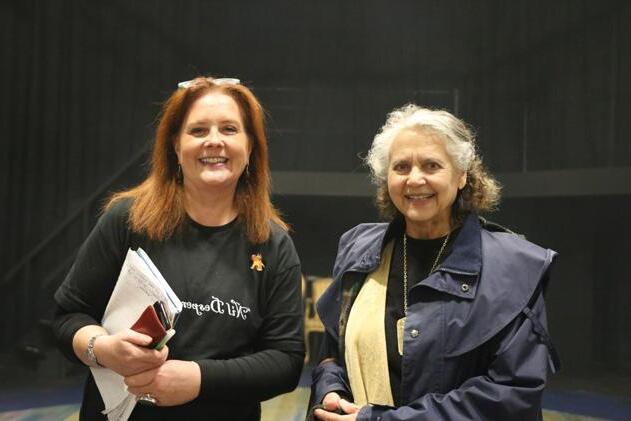
Bottom: members of the 2014 cast of Coram Boy join the cast of the 2022 production Middle right: Head of Drama Mrs Bower-Morris with Coram Boy author Jamila Gavin


Top: Years 8 and 9 performed Around the World in Eighty Days
Bottom: Year 12 Drama students perform their devised play The Rose

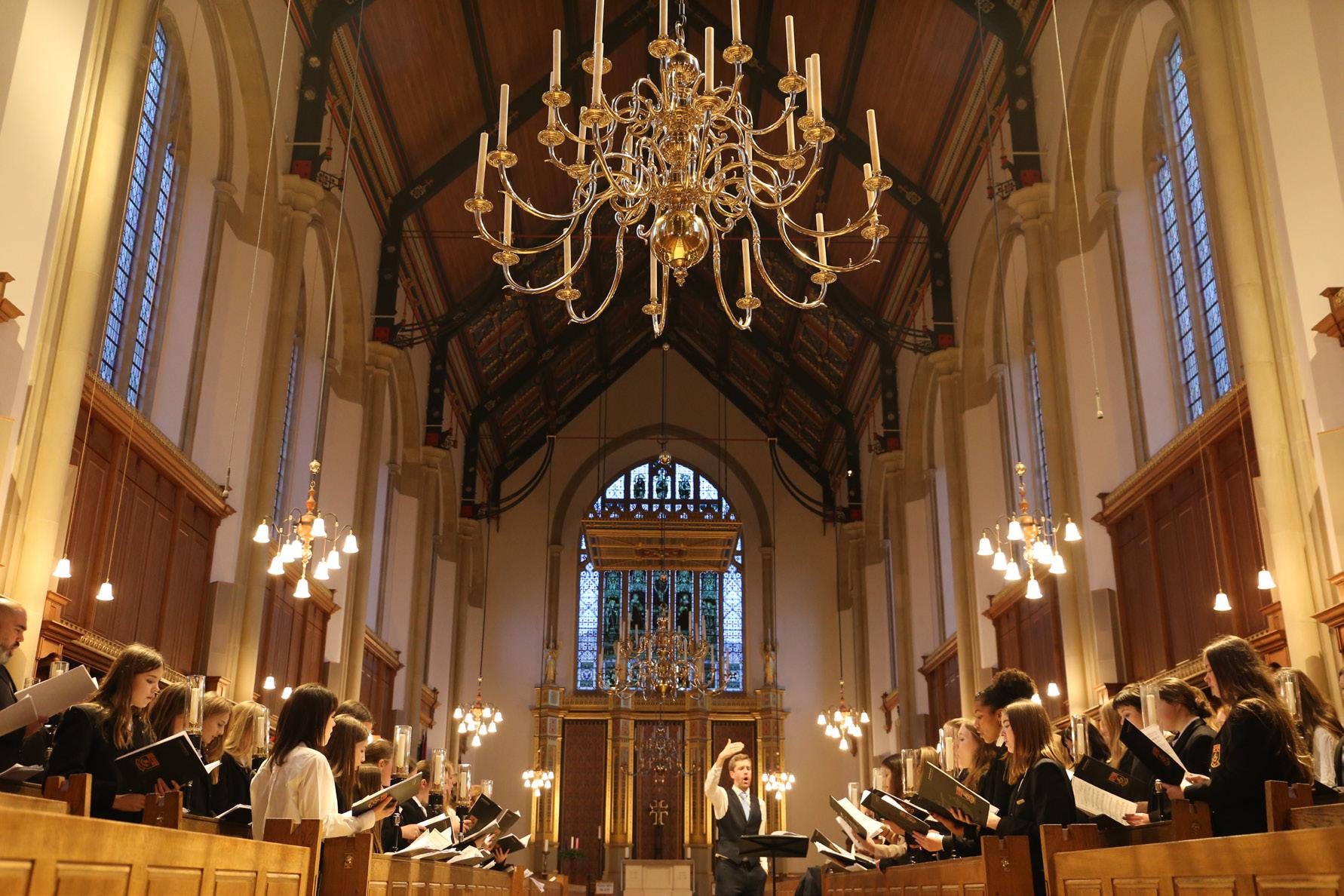
Music
Music runs through the heart of Wally and there is a wealth of choirs, bands and orchestras for students to perform in at various formal and informal concerts throughout the year. This year the Music Department also put on an opera: Henry Purcell’s Dido and Aeneas.

Above: The full Senior Orchestra accompanies the all-inclusive Year 7 choir at the Christmas Cracker Concert – postponed by snow until Twelfth Night!
Top left: Sisters Katya, Year 13 and Valya, Year 7 performing at Wally Stage and Screen
Bottom left: Rehearsing ahead of the Christmas Carol service in Tonbridge School Chapel
Borneo Expedition
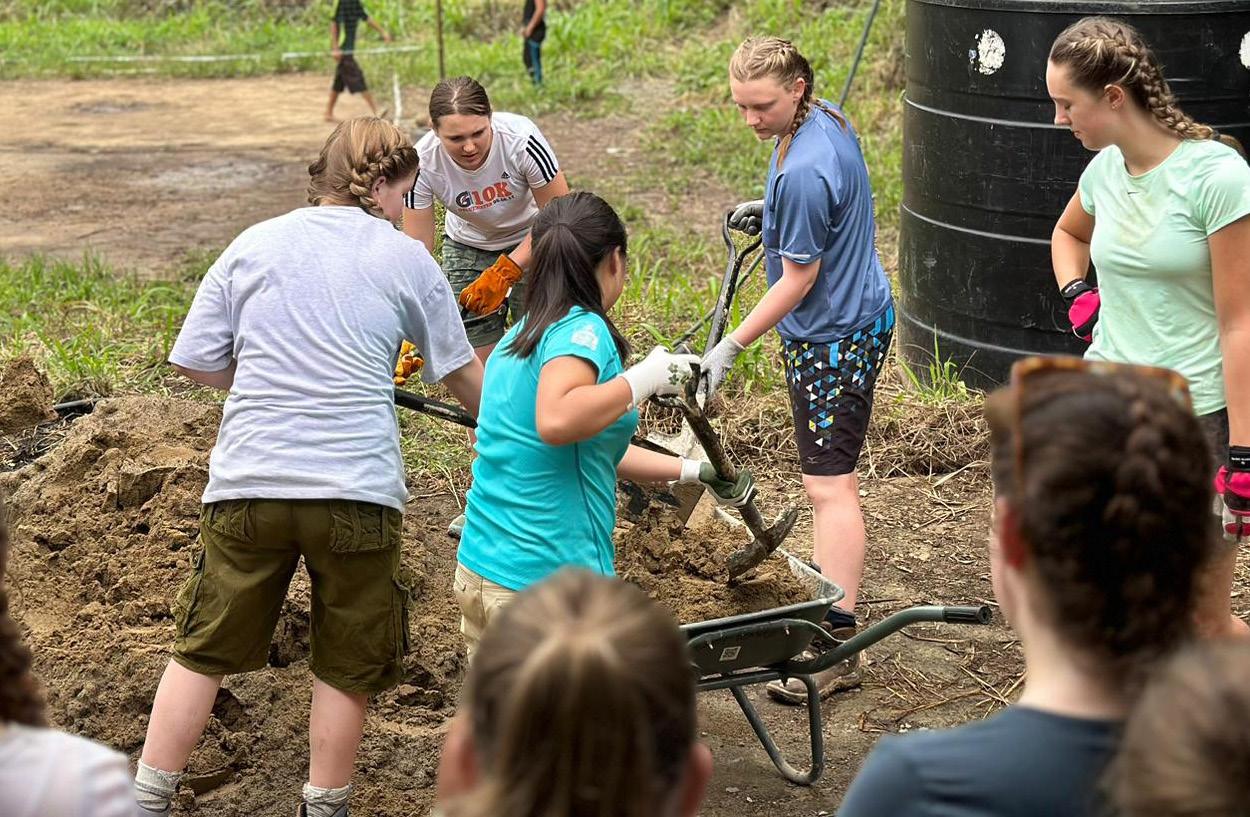
In the summer holidays, twenty students and two members of staff spent four weeks in Borneo on an expedition with Camps International. Staying in several locations in Sabah, the northern Malaysian part of Borneo, they worked on community projects, met local people, learnt to scuba dive and experienced the glorious wildlife on the island.


Milly
“Our first camp was Camp Tinganol where we were welcomed by the team, learnt how to introduce ourselves in Malay and slept in traditional bamboo longhouses.”
Rosie
“We hiked to our project sites, where we worked on building a community centre and installing a drainage system for the village”

Karis
“We spent four days on Mamutik Island scuba diving, snorkelling and learning about coral reef preservation. On our dives, we were able to see turtles, seahorses, angelfish and much more marine life.”

Maddie
“At Sepilok Orangutan Sanctuary, we saw young orangutans that had lost their mothers getting used to life in the wild. They came out of the trees for feeding time to play and relax.”

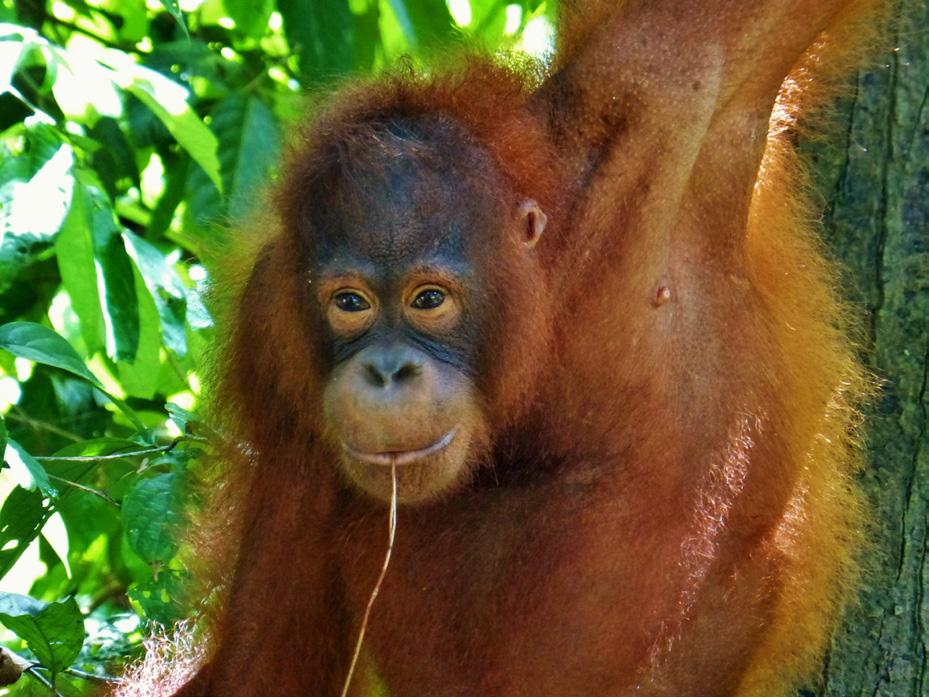
Liv
“Our project work at Camp Bongkud was mixing cement for drainage, laying slabs for a path, painting village buildings and teaching English to local kids.”


Dave Petre:
CHELSFIELD ROUTE
Worked in printing and IT for London law firm for 20+ years. Keen motorcyclist, (rides a Kawasaki Z900 50th anniversary edition).
Volunteer driver for local children’s hospice charity, Demelza.
SEVENOAKS

Phil Hardy: OXTED ROUTE
Falklands War veteran. Served in army Air Corps for three years as helicopter ground crewman. Worked as school caretaker and as a maintenance engineer for Priory Hospital.
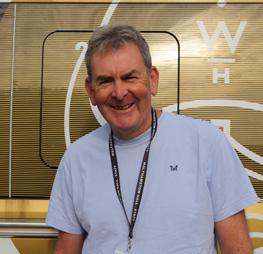
Mark Bradshaw:
PENSHURST ROUTE
Former Waitrose branch manager. Trained as a butcher. Keen tennis fan, plays tennis and squash.
PENSHURST
HILDENBOROUGH
CHELSFIELD
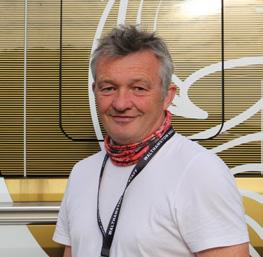
Pete Masters: FARNINGHAM ROUTE
Former Deputy Editor at Golf World magazine. Keen golfer at Limpsfield Golf Club. Keen motorcyclist. Writes a golf blog (pendarviapete. substack.com) sharing tales from his years reporting on the professional golf world.
Know Your School Bus Driver!
Their interests and careers before they started driving you to school and back

Steve Fletcher, Driver Coordinator:
HILDENBOROUGH ROUTE
Ex-Airforce and former Police Officer with 22 years’ service. Dog handler in Kent Police for 12 years.

Tony Fullbrook:
KINGSHILL / WEST MALLING ROUTE
Former Head of Mortgage Products at Barclays. 30+ years’ experience in the banking industry. Athletics official and coach at Tonbridge Athletic. Was a Field Ref at Wally Sports Day! Keen runner, cyclist and paddle boarder. Jazz drummer.
WEST MALLING


Top Year 13s serenade the rest of the School during Christmas Lunch
Bottom Alumnae attending our networking event at the Nomura building in London

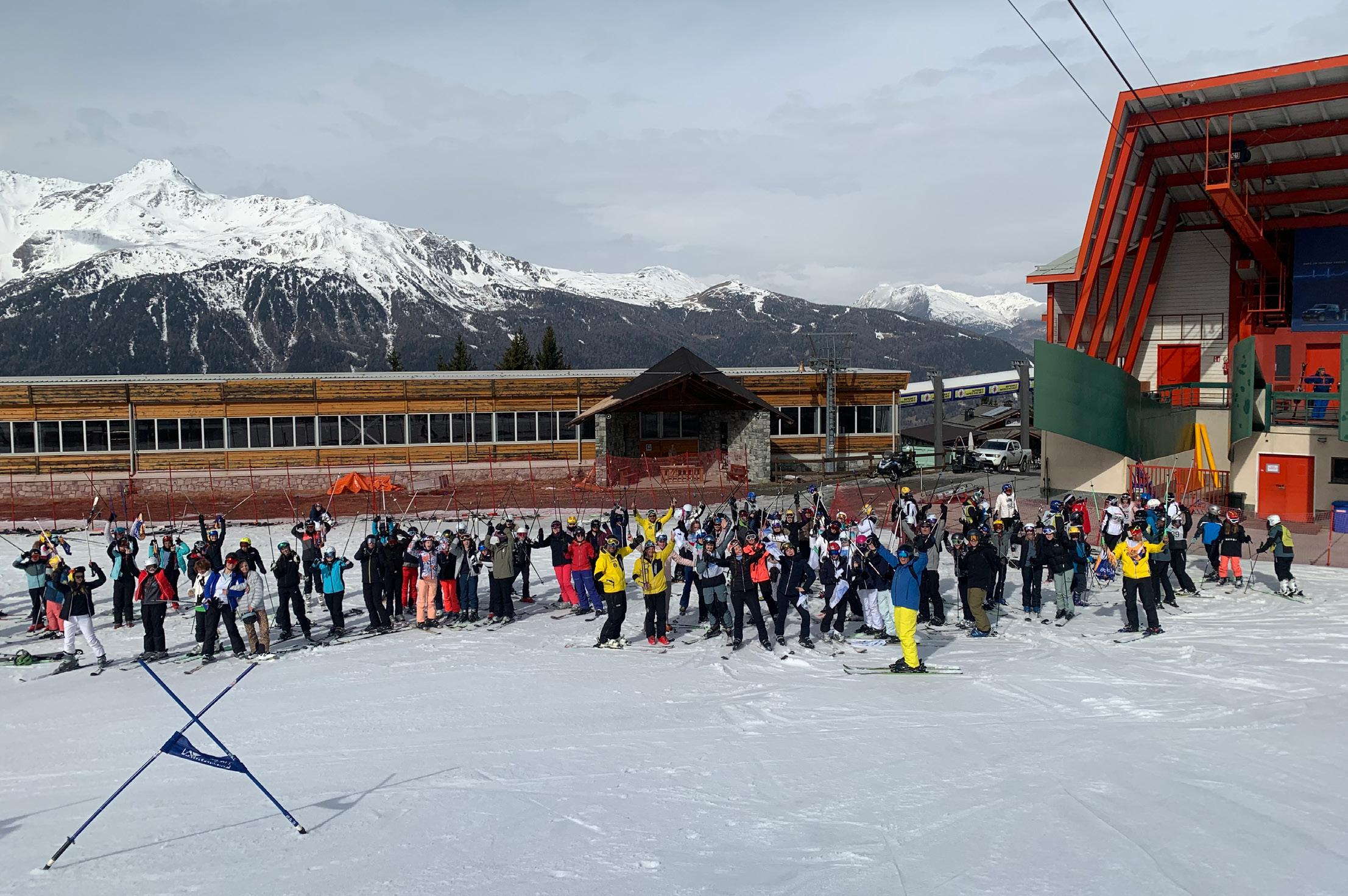
Top Students walking on a glacier in their Geography trip to Iceland in the October Half Term Bottom 120 students and 13 members of staff went on the School ski trip to Bormio in Italy in February 2023, all came home safe!
Sport Highlights
Our competitive teams played some fantastic sport in 2022-23 to win a National Bronze medal, two Regional and two County Gold medals plus many other top three placings at Regional and County level.

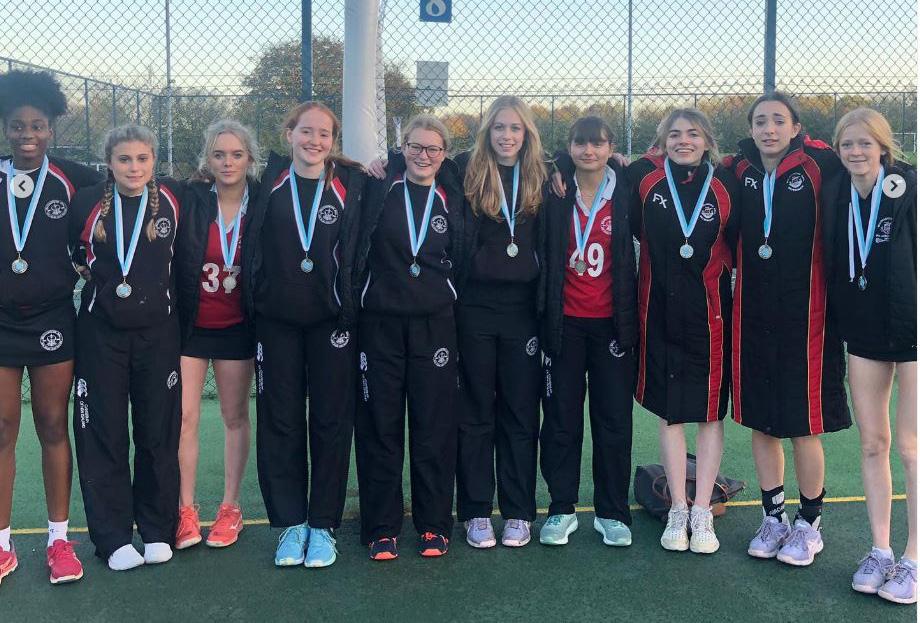
Two of our netball teams reached the regional stage of the Kent Schools competition. Our U14 netball team became Kent Schools Champions, going all the way to Nationals, where they won Bronze, third in the country!
Top U14 National Schools Netball finalists – bronze medallists Bottom U16 Kent Schools Netball – silver medallists


Top Our swimmers won the trophy for Best Girls’ School Team in Kent for the *fourth year in a row* at the Kent Secondary Schools’ Individual Swimming Championships.
Bottom Our Junior, Intermediate and Senior teams were all champions at the Weald and Downland Championships



Top left The U19 Gymnastics Squad were National Finalists after winning gold in the Regional Acro Finals.
Top right Imogen in Year 8 flew to Brazil to represent Walthamstow Hall at the International Sports Federation U15 Games and won the 200m Breaststroke
Bottom The U14 and U16 Badminton teams were London and South East Regional Runners Up




Kate French MBE, who won gold at the 2020 Tokyo Olympics in the modern Pentathlon, gave the address at our Sports Awards Dinner
U13 Kent Lawn Tennis Association Division Two Champions Top Kent Super 8s Outdoor Cricket Championship, U13 and U15 Kent County Runners Up
SENIOR
Sports Day
On a blisteringly hot day at Tonbridge School Athletics track, Penshurst held the House Sports Cup aloft

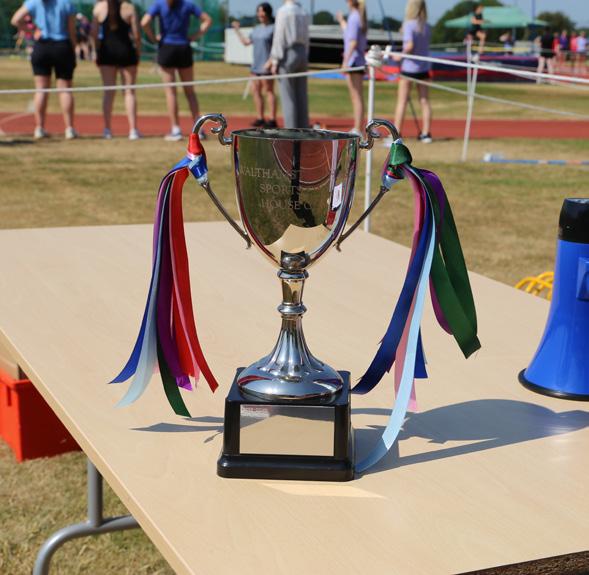



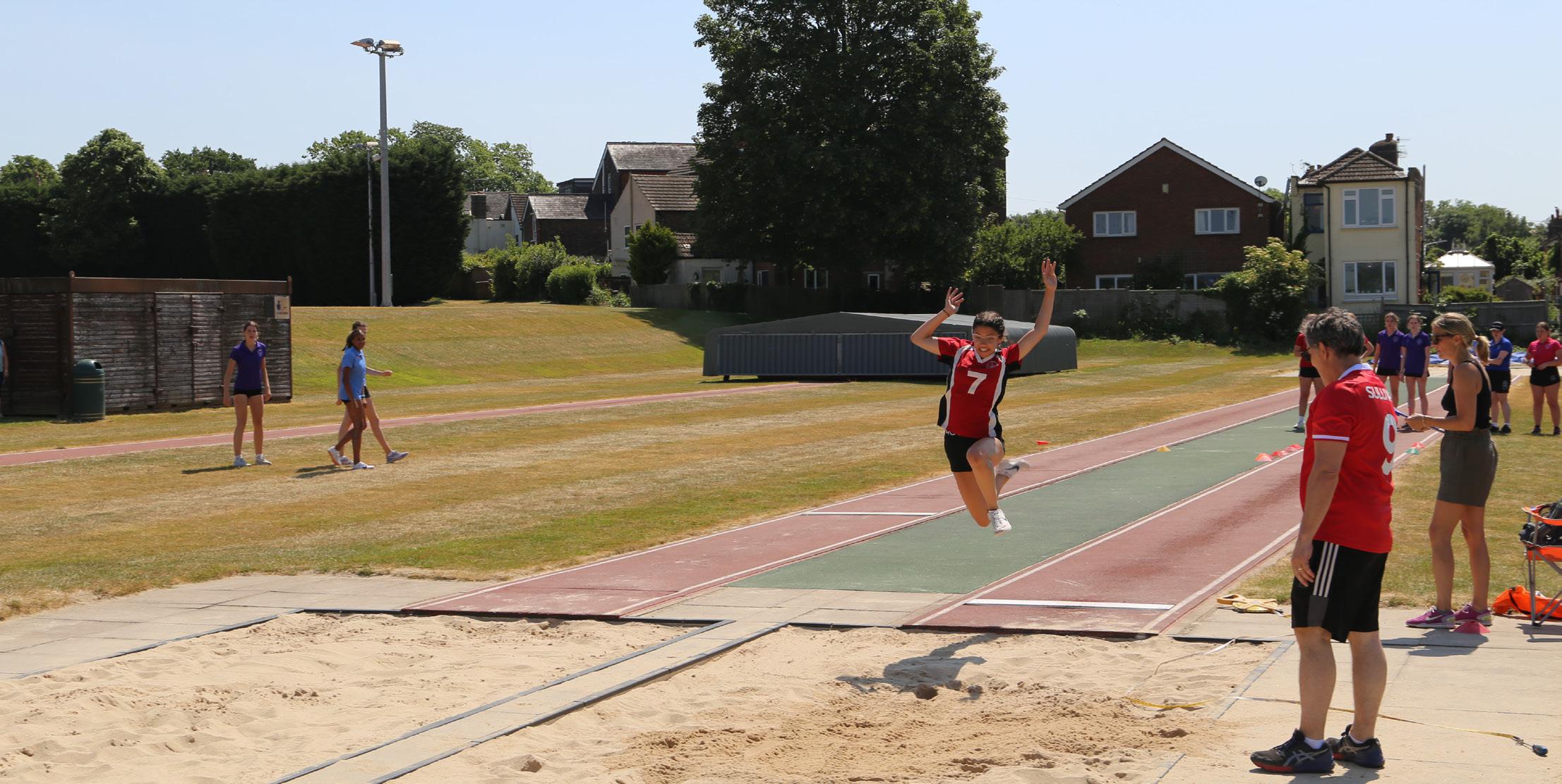
WHERE NEXT?
The Leavers’ Destinations pages at the back of the magazine show how varied our students’ interests are. CODA spoke to a few Year 13s across various academic departments, to hear about how they decided what to do next.

Anika
Engineering Degree
Apprenticeship with Laing O’Rourke
A Levels: Maths, Physics, Chemistry
The Laing O’Rourke apprenticeship course is accredited by the Society of Civil Engineering, not all places offer this. I don’t like the idea of debt, so the apprenticeship is the ideal route. I wanted to do something related to maths and physics that was also related to the real world. I did some civil engineering work experience recently, going underneath Thameslink. I went 50m down a man shaft into the Tideway which are new sewers being built under the Thames. They’re not being used yet so they were nice and clean!

Elsie
Operations Apprenticeship at Barclays in Glasgow
A Levels: Geography, English, Textiles
I applied for a few Degree Apprenticeships because they are competitive to get onto. I wanted to do one with a large company like Barclays because it gives the opportunity to work in different sectors of the business. I will be working four days a week for Barclays and one day a week I’ll be doing my degree. The key thing for me was learning on the job, that works so much better for me than sitting down and listening to someone talking at me all day. I’ve always been quite business-driven; I’ve been involved with the family manufacturing business for the last four years or so.

Beth
Architecture (with placement year), Loughborough University
A Levels: Maths, Further Maths, 3DD Physics
I’ve been interested in architecture since I was quite young, watching Grand Designs on TV. In Y10 and 11 I was trying to decide between architecture and engineering. I did some work experience in both and decided architecture was my favourite because it was really collaborative and creative, bouncing ideas off each other. I really enjoyed making this big installation piece [see page 15] in my coursework at Wally. We had to take everything out of the kitchen to set it up and film it being projected.

Elizabeth
English, Durham University
A Levels: English, Art, Geography and Textiles
I’ve always loved English, and pretty much from the age of three I was saying to my parents I wanted to be a writer. Any time there’s a story, or people to talk to, my imagination runs wild, sometimes a bit too wild. So I really wanted to do a degree so I could dive into it for three or four years. I have loved the community feel of Wally. I came from schools that were really big and international, they were great for that reason, but you could get lost in a sea of people. Whereas here, all the years mesh together and everybody knows everybody and the teachers are lovely.

Emma
Environmental Science, University of York
A Levels : Geography, Maths, Physics
I wasn’t sure what I wanted to study at university at first, so I looked at lots of things, like Criminology. I decided on Environmental Science as it’s like Geography but more science-based, looking at rocks, water, soils, ecosystems. Many of the modules are based on how to react to climate change. I did my EPQ on what diet is best for the environment, concluding that a vegetarian diet is best, because veganism has a lot of air miles associated with it. Afterwards, I want a job that’s with people because I’m quite sociable, I can’t just sit in an office.
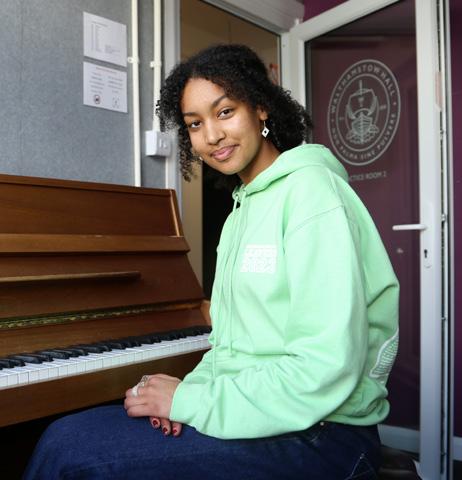
Jemima
Applying to music conservatoires for 2024 entry
A Levels: Music, English, Art
I joined Wally in Year 12 because I was looking for a Sixth Form with a strong Music Department. It’s a really lovely atmosphere to be working in as a musician. There are so many opportunities: we can perform weekly in Prayers, there are termly concerts, informal ones and bigger ones. Going to Venice on the Choir tour was lovely. Probably my favourite performance here was playing Bach’s Oratorio in an Easter Service. This afternoon me and the rest of the A Level Music class are going to sing “History” by One Direction at Wally Pop!

Isabella
Modern Languages, University of Exeter
A Levels: English, French, Politics
I’ve always been fascinated by languages; the ability to communicate with someone else in their mother language is a sign of respect, it shows you are interested in their culture. I used to live in the United States and I went to an international school where everyone spoke different languages. I was jealous, so that’s when I started learning French and a bit of Spanish. After my degree I would like to work in a big international organisation like the UN, anything that let me travel would be nice.

Katie
History, Newnham College, University of Cambridge
A Levels: History, Economics, Maths and Further Maths
History - everything that happens today is built upon it, so in my head it just makes sense that you’d want to learn about it. There are so many interesting stories and people, it’s a neverending source of things you can examine. Doing research was a great part of my History A Level. I investigated when the concept of ‘teenage’ began to be recognised in the US. I argue for the 1930s and 40s. For my Cambridge interview I had a lot of preparation here, I think the practice interviews were more stressful than the real one!

Lily
Food Science and Nutrition, Surrey University
A Levels: Religious Studies, 3DD, Biology
For a long time I was interested in nursing, which is about treating disease, but with nutrition, it’s more about preventing it. Hopefully at the end of this course I will be a qualified nutritionist looking at diets and eating plans. I have enjoyed my A Level Biology course because often after learning about something I see it in the world around me, which is interesting. We had a food energy section which set me thinking about the practical application of this knowledge. I had some work experience at a GP practice, spending time with the doctor and the midwife.
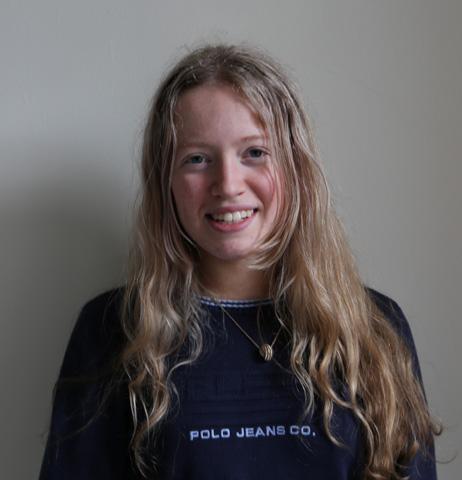
May
Philosophy, Politics and Economics, Durham University
A Levels: English, History, Politics, Maths
English is my favourite subject, but [History Teacher] Miss Murphy was really helpful in suggesting PPE so I could keep going with the essays but also the maths in Economics. I like learning about the ideologies in Politics, it’s almost like Philosophy in the way you’re finding out how people think. It’s interesting to think about one’s own views when you’re learning about socialism and capitalism. People might say “Keir Starmer is a Tory”, so you look at what he’s actually up to and see deeper behind the superficial insults. I want to either go into the Civil Service and politics or try the financial sector afterwards.

Maddie
Fine Art, Edinburgh University
A Levels: Art, Geography, Politics
I have been offered places at Art School without doing a Foundation course because at Wally we have tried most of it already: sculpture, print-making, textiles. Even at GCSE here you can pick your topics; I chose portraiture. At first I thought I would do politics and international relations, but when I went to a uni Open Day lecture on Art I felt so much more excited! My family are very academic and I don’t know many people who have gone off to do Art, so [Art teacher] Mrs Solan explained some of the jobs it can lead to. I think I’d like to go into creative advertising.

Rosie
Classics and the Ancient World, King’s College London
A Levels: Classics, Art, English
I love the subject so much. I went into Year 12 not doing any Latin, but [Classics teacher] Mr Buckingham ran me through the subject and I haven’t looked back. The whole class is doing Classics at university, we love the lessons. You do prose: The Aeneid and the Odyssey, and then Greek theatre and Greek religions with Euripides and Sophocles. There is so much intertextual stuff with Classics. In English, when we’re doing Keats, there are so many references, our teacher will ask “Daisy and Rosie, what can you tell us about this?” and we’ll give the back story to Psyche.

Ruby
Fashion Marketing, University of the Arts, London
A Levels: Drama, Textiles, English, Sociology
Textiles and Drama are my favourite subjects. I LOVE the fashion side of Textiles, the garment creation. I like English too but I see myself doing something visually creative so that’s why I chose marketing. I want to have visual input and to help create an image. The biggest thing I’ve discovered doing Textiles here is the individuality of fashion. I based my Textiles coursework on the brand ‘Off White’, exploring their new outlook on female fashion: different silhouettes, different fabrics and textures. Breaking down boundaries between gendered fashion; I think fluidity is really important.

Sophie
Biomedical Sciences with professional placement at University of Bath
A Levels: Maths, Chemistry, Biology
I like Human Biology and at first thought I wanted to go down the medicine route, but then realised I was better suited to working in a lab. I went to the Institute of Cancer Research for two days of work experience last summer. I was with all the scientists investigating certain aspects of sarcomas, which was really interesting. At Wally I found the Biology practicals very exciting, especially the dissection. Further down the line, I would definitely like to work in cancer research. I’m really passionate about that.
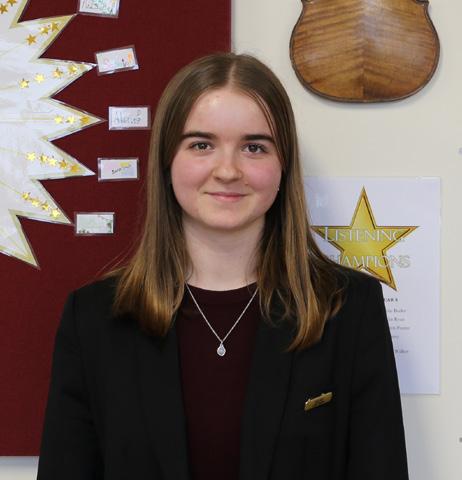
Sasha
Post Qualification Application
A Levels: Music, Biology, English
I am definitely studying music at uni and afterwards I’d love to go into film music. I play violin, piano and flute, ukulele and guitar too and I also sing. I’m a music scholar. When I joined in Year 7 there were so many opportunities to get involved, so many ensembles, for every instrument – and choir tours too. I didn’t know I liked composing until Year 9, when we had to compose a piece for Wallace and Gromit and add sound effects. [Music teacher] Mr Clements has given me so much support. I show him music I’ve written and he helps me so much in his own time, it’s so valuable.

YEAR 13 LEAVERS’ DESTINATIONS
Maria University of Bristol Modern Languages
Holly Bath Spa University Business and Management (Marketing)
Elsie Barclays Apprenticeship
Amelia University of Bath Management with Work Placement
Harriet University of York Economics and Finance
Elsa Gap Year then University of Exeter Geography with Professional Placement
Madeleine Durham University Law
Charlotte Loughborough University Criminology
Amie-Jane Gap Year
Eleanor King's College London European Politics
Rebecca University of Southampton Politics
Eleanor PQA
Daisy Cardiff University Human Geography
Alannah University of Exeter Geography
Ella University of Bath Pharmacology
Sasha PQA Music
Maja Gap Year then Durham University Biological Sciences
Amy LSE (London School Economics) Sociology
Anika Degree Apprenticeship with Laing O’Rourke
Elizabeth Durham University English Literature
Thea Durham University Anthropology
Isabella University of Exeter Modern Languages
Natalie University of Southampton Mathematics
Jemima PQA Music
Ella University of Exeter English
Kateryna Ashbourne College Film Studies A Level and PQA
Scarlett University of Reading Environmental Management and Sustainability with Placement Year
Isabella University of Bristol Cellular and Molecular Medicine
Lilianne University of Keele Medicine
Florence PQA
Kayla Royal Holloway Classical Archaeology and Ancient History
Lidia University of Manchester Modern Language and Business & Management (Spanish)
Daisy Durham University Liberal Arts
Beth Loughborough University Architecture (with placement year)
Madeleine University of Edinburgh Fine Art
Ella Bath Spa University Film, Television and Digital Production (Professional Placement Year)
Emma University of York Environmental Science
Imogen University of Surrey
Isabella University of Leeds
Daisy University of Bristol

International Event Management
Environment and Business
Social Policy and Sociology
Katherine University of Cambridge History
Rosie King's College London
Classics and the Ancient World
Iona Oxford Brookes University Psychology
May Durham University
Aiko University of Exeter
Isobel Durham University
Philosophy, Politics and Economics
Business and Management
English Literature and Philosophy
Emma UCL (University College London) Classics
Lilly University of Surrey
Sophie University of Bath
Imogen Cardiff University
Isabella St George's University of London
Rebecca Loughborough University
Ruby University of the Arts London
Thea Unilever Apprenticeship
Ilona University of the Arts London
Dot University of Exeter
Ava University of Manchester
Food Science and Nutrition with Foundation Year
Biomedical Sciences with Professional Placement
Biological Sciences
Biomedical Science
Politics and International Relations
Fashion Marketing
Fine Art (Drawing)
Medical Sciences with Professional Training
Fashion Marketing
Liberty University of Bristol Anthropology
Isobel PQA
Language and Speech Therapy
2022 LEAVERS POST QUALIFICATION APPLICATION DESTINATIONS
Kathryn University of Liverpool
English Literature
Emma Durham University Biological Sciences
Mariella Durham University Geography
Rachel University of Leeds
Arabic and Russian A
Katherine University of Leeds Film, Photography and Media
Aislinn The University of Edinburgh
Isabella University of Bath
German and English Literature
Politics and International Relations with professional placement or study abroad
Hannah Bournemouth University Paramedic Science
Abigail University of Exeter Drama
Katie University of Reading Law
2021 LEAVERS POST QUALIFICATION APPLICATION DESTINATIONS
Olivia University of Glasgow
Film and Television Studies

@walthamstowhall www.walthamstow-hall.co.uk
Headmistress: Ms Louise Chamberlain, BSc Hons, PGCE Senior School, Holly Bush Lane, Sevenoaks, Kent, TN13 3UL | marketing@whall.school
